President’s Podium: Relationships at heart of Primerus™ community
Canadian group helps clients navigate rules of the road
Ski options go beyond bounds of adventure

WINTER 2023 | 1 The World’s Finest
Firms™
Law
Paradigm Winter 2023 TM
About Our Cover
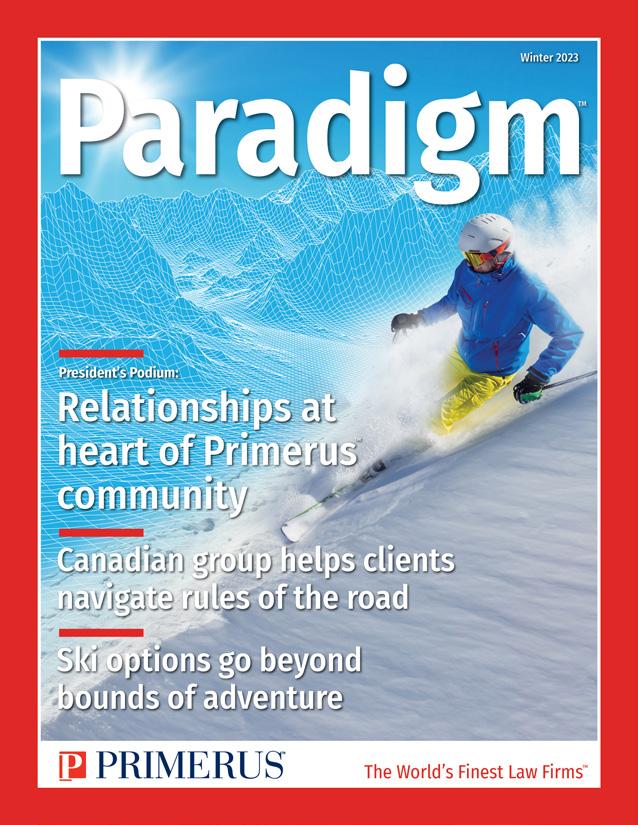
A love of skiing traverses both hemispheres in the world of Primerus™, where winter adventures await at some of the finest resorts recommended by a select group of members.
The Primerus Paradigm™
Winter 2023
President’s Podium: A key word remains at the heart of growing Primerus™ community

page 4
Crisis point
Chaos reigns supreme in a world longing for a true sense of order
page 6
Publisher & Editor-in-Chief: John C. Buchanan Managing Editor: Chris Dawe
Every lawyer in Primerus™ shares a commitment to a set of common values known as the Six Pillars:


• Integrity
• Excellent Work Product
• Reasonable Fees
• Continuing Legal Education
• Civility
• Community Service
For a full description of these values, please visit primerus.com.
2 | THE PRIMERUS PARADIGM ™
2023 International Society of Primerus Law Firms™
©
intended for
purposes only and do not
Articles in this publication are
informational
convey or constitute legal advice.
IN THIS ISSUE
Why Primerus™?
New Foundation aims to provide the tools for promoting change
page 9
President of California firm followed his career passion literally from the ground up
page 12
Notre Dame de Paris
Attorney lends helping hand to rebuilding of a French icon
page 15
Winter wonderlands
Ski options go beyond the bounds for those who revel in adventure
page 18
Off-trail
A far away ski story destined to live a very long life in his memory bank
page 24
International Summit to accentuate a theme vital to world’s future
page 26
Legal roots run deep in family of Peruvian attorney with U.S. ties
page 28
All business
Canadian Practice Group helps clients navigate rules of road
page 32
Surprise court appearance altered career trajectory of New Delhi attorney
page 36
Embrace Equity
Soviet refugee found her legal passion in a new promised land
page 40
First rate
Chicago attorney relishes his leadership role at firm
page 44
Belief system
Personal injury lawyer stays true to his Wyoming roots
page 48 COMMUNITY SERVICE
Hong Kong attorney offers helping hand to ‘home-awayfrom-home’
page 52
YOUNG LAWYERS
Young attorneys seek the sweet spot in work-life balancing act
page 54
Primerus™ Member Law Firms
page 57
WINTER 2023 | 3
A key word remains at the heart of growing Primerus™ community
Admittedly, I’m a fan of good quotes, particularly those of the inspirational variety that have stood the test of time and in some respects get better with age.
One of those treasures was a timeless gift from the late Zig Ziglar, the famed author and motivational speaker who was a veritable
quote machine over the course of a career that spanned six decades.
In one of his speeches – which was simply titled, “Friends,” – Ziglar offered this pearl of wisdom:
“If you go looking for a friend, you’re going to find they’re very scarce. If you go out to be a friend, you’ll find them everywhere.”
That quote reflects much of what Primerus™ is all about, which can be observed at every meeting, seminar, conference, and convocation we offer throughout the year. At each gathering, we see an opportunity to
build relationships that serve as the fabric that knits us together as a vibrant and vital organization.
When Primerus™ was founded more than 30 years ago, it was done with a primary purpose in mind – to advance the legal profession in the eyes of the public.

The need was particularly great at the time, as lawyers – and the legal profession in general – were suffering from an identity crisis. The problem, as longtime Primerus™ member Joel Collins once commented, was

4 | THE PRIMERUS PARADIGM ™
President’s Podium
John C. Buchanan
that “lawyers had a tendency to think all the bad things being said about them were unfair, while the public was of the belief that all those bad stories were true.”
There, in stark terms, was the “rub” in the need to change public perception, which is a task that we soon discovered can’t be accomplished overnight. Instead, the process is long, arduous, and demanding of an infinite amount of patience for those accustomed to seeing quick results.
The work involved in changing minds is not a one-time assignment either. It can only happen over a matter of time after a sense of trust develops, where honesty and integrity serve as the cornerstones of the newfound connection.
As we embark on a new year, which to a degree figures to still be influenced by the lessons learned from COVID, our watchword will be “relationships.”
That, in essence, is our product. Members join and remain in Primerus™ primarily because we facilitate important relationships that help them become better people, better lawyers, and more successful in their personal and professional lives.
Primerus™ was built on the team concept, framed by the belief that being part of an extended global family can significantly enhance each member’s life experience. The proof can be seen in our continued growth, as we now include more than 150 law firms, more than 40 countries, and more than 2,500 lawyers. In comparison, when we were founded in 1992, Primerus™ was a one-city and one-state entity with but a handful of firms.
Our organization, of course, is bound together by the message of “Good People Who Happen to Be Good Lawyers™.” That phrase serves as our trademark and has been cemented by a belief in the Six Pillars, which are Integrity, Excellent Work Product,
Reasonable Fees, Continuing Legal Education, Civility, and Community Service. Those qualities have helped countless clients find the right lawyer, with the right skills, in the right location, and at the right cost.

A commitment to developing lasting relationships also will be a hallmark of the new Primerus™ Foundation, our philanthropic organization that was launched last year. Its mission is to help elevate the standards of the public service profession by promoting the concepts of civility, integrity, kindness, and concern for others.
Now, as 2023 begins to unfold, we can derive special satisfaction about being part of a legal community that shares a likeminded approach to relationship building, perhaps best expressed by Academy Awardwinning British actress Audrey Hepburn when she said, “The best thing to hold onto in life is each other.”
Best regards,
WINTER 2023 | 5
Jack Buchanan, President
“If you go looking for a friend, you’re going to find they’re very scarce. If you go out to be a friend, you’ll find them everywhere.”
Crisis point Chaos reigns supreme in a world longing for a true sense of order
 By Tom Kirvan
By Tom Kirvan
6 | THE PRIMERUS PARADIGM ™
There can be little debate that the world is in a state of crisis, besieged by problems mostly of its own making.

Since late 2019, we have been battered by a health crisis called “COVID,” which in its many iterations has touched every region of the globe at a cost of nearly 7 million lives, a staggering number that doesn’t begin to tell the true toll of human suffering and economic misfortune.
Just as the devastating impact of the pandemic appeared to be lessening, the world awakened to news in late February 2022 that Russia had invaded neighboring Ukraine in an unprovoked attack that already has cost hundreds of thousands of lives on both sides and caused more than 8 million refugees to flee for their safety.
The war in Ukraine, which has taken a wrecking ball to its once flourishing economy, is not the handiwork of some rogue dictator. Instead, it may prove to be the ultimate undoing of a Russian menace named Vladimir Putin, whose Napoleon Complex may yet manifest itself in a nuclear conflict of catastrophic proportions.
Sadly, Putin’s misguided foray into Ukraine has seemingly served as inspiration for two other communist dictators who regularly engage in saber-rattling for the sake of their own oversized egos.
Last summer, China’s President Xi Jinping ramped up his pressure campaign to annex Taiwan to the Mainland, ordering a series of military exercises designed to demonstrate its ability to strike anywhere and to assert its sovereignty over the entire Taiwan Strait. All this bravado at the risk of sparking a military conflict with the United States, which has pledged to come to the aid of Taiwan if attacked.
WINTER 2023 | 7
All the while, North Korean dictator Kim Jong-un has been flexing his military muscles, regularly test-firing intercontinental ballistic missiles that have the capability to strike Japan and the West Coast of the U.S. His willingness to develop long-range nuclear weaponry comes at the expense of the country’s populace, which officials at the United Nations have said suffers from some of the worst food shortages in the world.
Then there is Iran, another repressive regime that has nuclear intentions as well as a total disdain for the rights of its citizens, using indiscriminate and deadly force in cracking down on peaceful protests.
The ongoing protests were sparked last fall following the death of a 22-year-old Iranian woman who fell into a coma after being detained by Iran’s “morality police,” a Gestapo-like security force that metes out punishment for violating the country’s harsh strictures on dress. The political acts of defiance by protesters have resulted in hundreds of deaths, which reportedly have included scores of women and children who have challenged the country’s stifling restrictions on all aspects of social life.
All of this discord is merely the starting point in discussing the multitude of political flash points around the globe, where a general unwillingness to tackle such critical issues as climate change, economic inequality, widespread poverty and hunger, child abuse, gun control legislation, mental health treatment, and recurring threats to democracy leave us stuck in a state of quandary and stalemate.
Kristalina Georgieva, managing director of the International Monetary Fund (IMF), said as much during a speech last spring in Washington, D.C. at a program cosponsored by the Carnegie Endowment for International Peace.
The Carnegie Endowment was formed in 1910 with several lofty purposes in mind: to generate “strategic ideas and independent analysis,” to support “diplomacy,” and to train “the next generation of international scholarpractitioners to help countries and institutions take on the most difficult global problems and safeguard peace.”
Its origins, somewhat ironically, came just four years before the outbreak of World War I, often referred to as the “War to End All Wars,” a global conflict that lasted from 1914-18 and claimed more than 40 million casualties.
In reflecting upon the founding of the Endowment Fund more than a century ago, Georgieva said, “Our institutions are committed to shared peace and prosperity—especially vital goals at this crucial moment for the world we live in.
“To put it simply: we are facing a crisis on top of a crisis,” said Georgieva, a Bulgarian economist who has headed the IMF since 2019.
Georgieva, who holds degrees from Harvard Business School and Massachusetts Institute of Technology, said we are at a “consequential moment” for the international community.
“The actions we take now, together, will determine our future in fundamental ways,” she indicated. “It reminds me of Bretton Woods in 1944 when, in the dark shadow of war, leaders came together to envision a brighter world. It was a moment of unprecedented courage and cooperation.
“We need that spirit today, as we face bigger challenges and more difficult choices.”
The war in Ukraine, Georgieva said emphatically, extends far beyond that country’s battered borders.
“We know from global experience that conflict is the enemy of development and prosperity,” Georgieva indicated. “The high
cost of war has crippled and continues to cripple so many countries. As we hope for peace, we must do all we can to help Ukraine and all impacted countries.”
Her words should signal the need to end global fragmentation, spurring instead a tectonic shift to an international approach to problemsolving.
“In a world where war in Europe creates hunger in Africa; where a pandemic can circle the globe in days and reverberate for years; where emissions anywhere mean rising sea levels everywhere—the threat to our collective prosperity from a breakdown in global cooperation cannot be overstated,” Georgieva declared.
“The only effective remedy to these risks is international cooperation. It is our only hope for a fairer, more resilient future, and it is our duty.”
Her sentiment is shared by Primerus™ founder Jack Buchanan and longtime member Joel Collins, who over the past year have spearheaded the launch of the Primerus™ Foundation, a philanthropic organization dedicated to elevating the public service profession (see related story).
“Through our strong commitment to helping to make the world a better place, Primerus™ is taking action, seizing its duty through the Primerus™ Foundation to bring about meaningful change for the betterment of mankind in the nick of time,” said Buchanan. “It is our mission to promote positive change, the kind that will have an immediate and lasting impact on society.”
8 | THE PRIMERUS PARADIGM ™
Why Primerus™?
New Foundation aims to provide the tools for promoting change
 By Tom Kirvan
By Tom Kirvan
WINTER 2023 | 9
oking fun at a profession is an American way of life, particularly when the target comes dressed in fashionable attire with a giant bullseye painted on its back.
The tendency to stick the needle increases in frequency when it is the legal profession that comes into the crosshairs of would-be comedians, many of whom invariably trot out such cringe-worthy jokes as “What do you call 5,000 lawyers chained together at the bottom of the ocean?”
The answer: “A good start.”
In reality, such biting sarcasm served as one of the underlying reasons behind the start of Primerus™ some 30 years ago when the legal profession was under constant attack for its perceived “bloodsucking ways.”
The mistaken perception somehow became reality in the minds of the populace after the United States Supreme Court opened the door for lawyers to advertise their legal services, a 1977 ruling in the case of Bates v. State Bar of Arizona that would link the profession to the term “ambulance-chasers” for years to come.
In 1992, the disconnect was so great that Michigan trial attorney Jack Buchanan swung into action by launching the International Society of Primerus Law Firms™, a select group bound together under the umbrella of “Good People Who Happen to Be Good Lawyers™.”

That phrase, in all its simplicity, became the trademark for Primerus™, which began making a name for itself due in part to a series of creative ads that ran in the print and broadcast media. Buchanan originally developed the ad campaign to help bolster the fortunes of his Grand Rapids law firm, Buchanan & Bos, in 1990.
“By 1992, they were so effective along with our ‘How to Judge an Attorney’ brochure and our phone book ad that we were able to launch what is now Primerus™,” explained Buchanan, a University of Michigan Law School alum.
“The ads generated a lot of positive feedback from members of the bench and bar, most of whom were delighted that we were doing our part to advance the legal profession in the eyes of the public,” Buchanan added. “I think that many of them were tired of lawyers constantly being the butt of bad jokes.”
Primerus™, according to Buchanan, is a society of the “world’s finest independent boutique law firms” and is comprised of carefully selected firms in nearly 200 cities and more than 40 countries around the globe.
“Primerus™ firms are characterized by their commitment to the Six Pillars, which include Integrity, Excellent Work Product, Reasonable Fees, Continuing Legal Education, Civility, and Community Service,” said Buchanan, noting that the Primerus™ name has “become synonymous around the world with high quality legal services” at a fair price.
“The most important decision a client must make in resolving or avoiding legal problems is finding the right lawyer, with the right skills, in the right location, and at the right cost,” Buchanan said.
Attorney Joel Collins, co-founder of the South Carolina law firm of Collins & Lacy, is a believer in the Primerus™ approach. He became acquainted with the then fledgling organization in 1995 when he read an article about it and decided to attend a conference for prospective members.

“After reading the article, I was intrigued by their efforts to counter the negative public opinion that people have about the legal profession,” said Collins, a former member of the Judge Advocate General Corps and a Vietnam War vet who was awarded the Bronze Star and Army Commendation Medal. “Primerus™ was dedicated to elevating the standards of the profession by word and by example. The problem was that lawyers had a tendency to think all the bad things being said about them
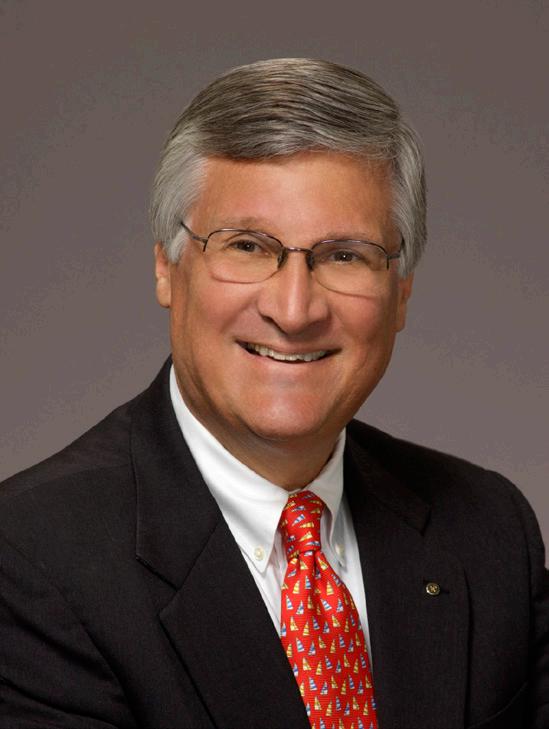
10 | THE PRIMERUS PARADIGM ™
P
John C. Buchanan Joel Collins Lee Silver
were unfair, while the public was of the belief that all those bad stories were true.”
There, in stark terms, was the “rub” in the need to change public perception, said Collins.
“The Six Pillars are the backbone of the organization and have enabled Primerus™ to develop a network of high-quality law firms that can service virtually any legal need at a reasonable fee,” he said. “Every firm in Primerus™ is thoroughly vetted to ensure that they meet standards of excellence.”
The growth and success of Primerus™ over the past three decades has now set the stage for its next chapter, according to Buchanan and Collins. The two longtime friends have teamed with Grand Rapids attorney Lee Silver in recently announcing plans for the Primerus™ Foundation, a philanthropic organization dedicated to elevating the standards of the political and public service professions.
“As lawyers, we feel a duty and responsibility to help preserve the ideals of the Founding Fathers and the great experiment in democracy,” said Buchanan. “By creating this foundation, we are demonstrating our respect for the dignity and inalienable rights of all people,
serving as soldiers for good in the fight for freedom, liberty, and equal justice.”
In effect, explained Buchanan, the Primerus™ Foundation will be a timely extension of Primerus™ itself, expanding the concept of the Six Pillars into the public service realm for the good of society.
“We created Primerus™ in response to repeated attacks against the legal profession,” said Buchanan. “Now, as attacks have increased and intensified against democracies, we want to preserve and protect our democratic institutions through the work of the Primerus™ Foundation.”
In shaping the mission of the Foundation, organizers have opted for a two-step approach. Step one involves forming a nonpartisan think tank, bringing together some of the brightest minds in the world to propose workable solutions to our most vexing political, economic, cultural, medical, and environmental problems.
Step two revolves around providing funding support on a bipartisan basis for political candidates of character, conviction, and intelligence who are committed to promoting the public good at the expense of any self-interest.

“Candidates we identify and support will embody a spirit of cooperation, as well as a desire to set aside their own interests and agendas for the much higher purpose of advancing common goals for the betterment of society,” Buchanan declared. “They will be women and men of honesty and integrity who believe in civility and the need for a sea change in the way we operate politically.”
While others have attempted in recent years to bridge the political divide with limited success, organizers of the Primerus™ Foundation believe the current set of crises engulfing the world demand concerted and immediate action. In short, they are of the mind that “it’s never too late to do the right thing,” and hope that those inside and outside the legal profession wholeheartedly agree.
Said Buchanan: “Our objective is to make the world a better place for current and future generations – to become a positive force that has the power to inspire, uplift, and heal us. It’s a challenge we fully embrace, and we welcome your support in helping us supply the courage, conviction, and means to tackle it in the years ahead.”
WINTER 2023 | 11
President of California firm followed his career passion literally from the ground up
 By Tom Kirvan
By Tom Kirvan
12 | THE PRIMERUS PARADIGM ™
In his youth, Trevor Resurreccion was intrigued by construction projects, developing a special fascination for how buildings and houses took shape around his hometown of Seal Beach, California, a quaint Orange County coastal city south of Los Angeles.
He spent many weekends tagging along with his dad as they kept tabs on the progress of various building projects in the city sandwiched between Long Beach and Huntington Beach on the Pacific Coast.
“From an early age, I was fascinated by how structures were built, rising from the ground up to something that would eventually become a home for a family or a business of some sort,” said Resurreccion, a partner and board president at Lynberg & Watkins, a three-office Southern California law firm based in the city of Orange.
His interest in the construction industry was fueled even more by a week-long internship in the Washington, D.C. area that he enjoyed as a high school student.
“I had the opportunity to go back east in the summer of my junior year of high school for an unpaid internship with an international architecture and engineering firm where one of my dad’s Army buddies headed up the Washington, D.C. office,” Resurreccion explained. “It was 1996 and one of the projects the company served as the architect of record was the construction of Reagan National Airport, which, of course, was a massive undertaking. I also had the opportunity to see the firm’s design work for a new bank building and in overseeing the construction work at the National Shrine adjacent to Catholic University.”
The final stop, interestingly enough, would prove to have lasting consequences for the young high school student. It
was there – at The Catholic University of America on a 176-acre campus in northeast Washington – that Resurreccion was about to develop a life-long connection.
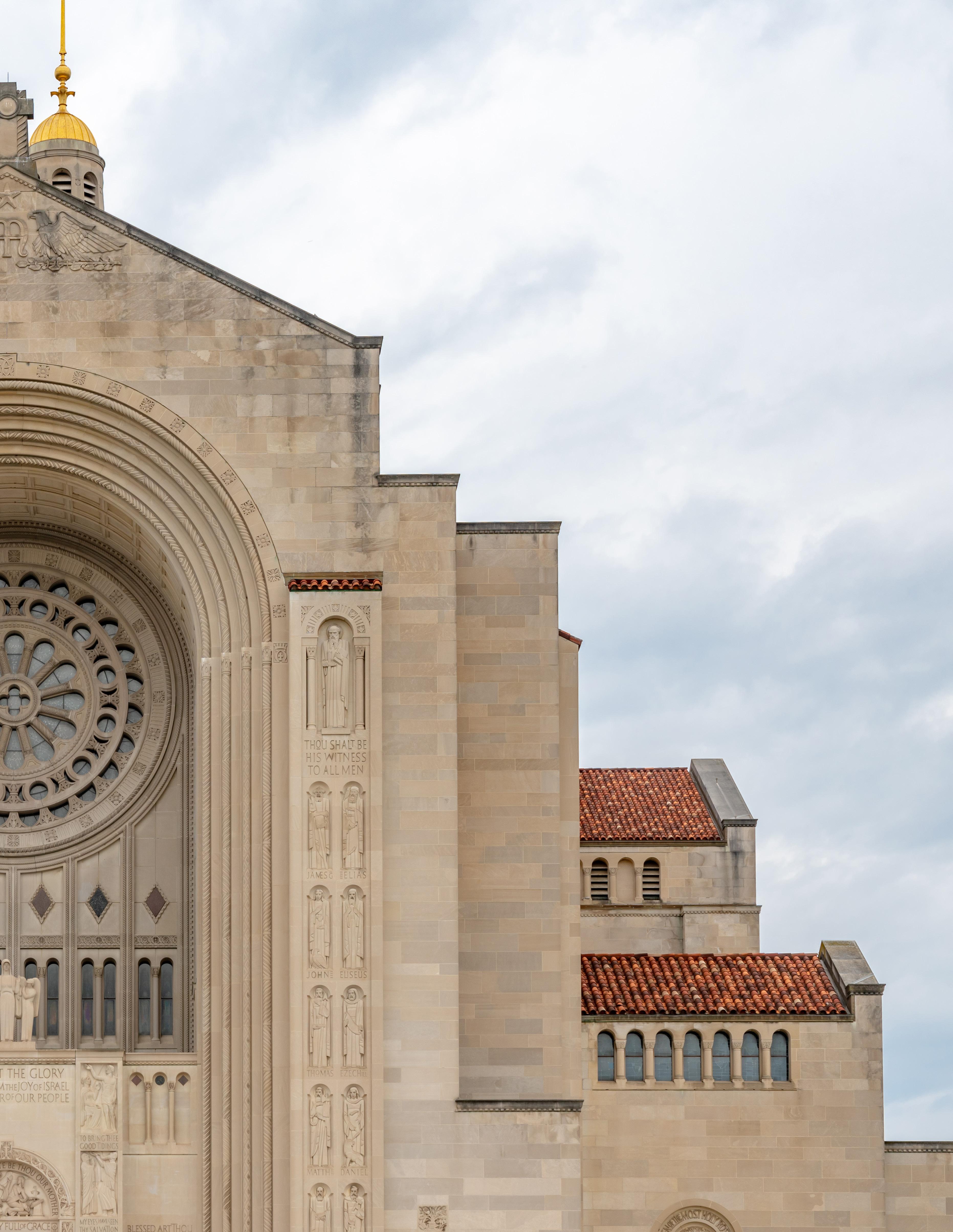
“I took the Metro to the campus and got a glimpse of its beauty,” said Resurreccion. “In all honesty, I had never even heard of the university before then. The owner of the firm where I interned attended architecture school there and I was so impressed with what I saw that I ended up applying for admission. Fortunately, they offered me an academic scholarship, which made it the equivalent of going to a private school at a public university price. Plus, I was given the opportunity to study and live in a major city, and not just any major city.”
Resurreccion eventually would earn a bachelor’s degree in architecture, graduating magna cum laude in 2001, hoping to parlay his interest in construction management into a legal career.
“I never had an intent to become a licensed architect,” Resurreccion acknowledged. “I wanted to use my architectural background in developing a sort of niche practice in the construction law field.”
He returned to the West Coast for law school, obtaining his juris doctor, cum laude, from Chapman University School of Law in 2004. During law school at Chapman, which is located in Orange County, Resurreccion worked for a solo practitioner who specialized in construction litigation, “giving me a glimpse of the basics of the litigation process and how important it is to be prepared when you head to court.” For the last two years of law school, he worked in-house for a national insurance carrier assisting in the defense of a variety of general liability cases, which also provided him with additional experience and learning opportunities for litigation from soup to nuts.
WINTER 2023 | 13
The skills he developed there proved useful when Resurreccion joined a relatively new law firm that specialized in representing design professionals. He was just the eighth attorney hired by the firm that had offices in Orange County and Las Vegas, where Resurreccion soon began spending some of his time.
“I had a lot of opportunity early on to prove myself, taking depositions, oral argument in the courtroom and drafting dispositive motions,” said Resurreccion. “I started devoting a good portion of my time to cases in Las Vegas that in 2008 the firm asked me to sit for the bar exam in Nevada, which was a major challenge while I was handling a heavy caseload.”
After a week-and-a-half “cram session” for the exam, Resurreccion took the bar on a laptop he borrowed from his boss. All went well until the laptop crashed 10 minutes into the final essay, forcing Resurreccion to complete the exam the oldfashioned way – by bluebook.
“I got a special exemption for that,” he said with a sigh of relief.
The legal pace continued to quicken for Resurreccion in 2008-09 as the firm’s clients in Las Vegas dealt with the aftershocks of the Great Recession.
“Las Vegas was hit harder than California during the Recession, as I had my first introduction to mechanic’s lien law and collection work,” he said. “I was flying between Orange County and Las Vegas on a regular basis, as the firm was providing me with the opportunity to work on a wide variety of cases.”
His star continued to rise in 2011 when he was asked by his former boss to argue a case before the Utah Supreme Court at the age of 33, a year before he made partner.
“Even though I was doing well and had developed a substantial book of business,” Resurreccion indicated, “I could tell that long term it wasn’t going to be the right fit. So, when I was offered a job by Lynberg & Watkins in 2017, I saw it as a great opportunity to build my own team and to broaden my construction litigation practice.”
Founded in 1971, Lynberg & Watkins has offices in Orange and Los Angeles and consists of 40 attorneys. The firm’s core practice is in civil litigation and insurance coverage, representing public entities, insurance companies and their insureds, private corporations, and individuals on a national, regional and local level.
The founder of the firm, the late Charles Lynberg, was a U.S. Army veteran of the Korean War who earned the Purple Heart award for injuries sustained in combat. He also graduated first in his class at the University of Iowa College of Law and enjoyed a distinguished public service career as an Assistant U.S. Attorney in California, prosecuting organized crime figures during both the Eisenhower and Kennedy administrations.
Resurreccion became a shareholder of the firm in January 2019 and was elected to the Board of Directors in 2020, helping to implement a series of changes in its management operation.
“Our goal is management consensus, and we make a real effort to give everyone a voice in shaping the firm’s future,” said Resurreccion, who became president of Lynberg & Watkins earlier this year. “We emphasize inclusion, transparency, and democratic governance.”
Although he admitted to being “stretched very thin” by the demands of his practice and the administrative responsibilities of being president, Resurreccion said the firm’s “team approach to decision-making and problem-solving” has made his workload manageable.
“We have assembled a very talented and dedicated team, which allowed us to grow and to diversify our practice areas,” said Resurreccion. “The future looks bright.”
His optimism is partly due to the firm’s involvement with Primerus™, which began in 2019 at his urging. He viewed it as an opportunity to develop a new marketing approach that could yield national and international dividends.

When Resurreccion went to his first Primerus™ convocation in Florida in 2019, the experience proved immediately valuable.
“All of the Primerus™ attorneys I have met from across the country and around the globe are top-notch in their respective law practices,” he said.
“Primerus™ has proven to be an excellent organization for networking with the very best attorneys out there.”
In October 2022, Resurreccion took time out of his busy schedule to attend the Primerus™ Global Conference held in nearby San Diego, once again finding the event as a golden opportunity to renew and develop business relationships. Even if it came at the expense of some much-needed leisure time for him.
Attorney Trevor Resurreccion is one of three children. His mother, Kathy, worked in special education at the local elementary school before retiring, while his father, Richard, was a professor of vocational education at California State University, Long Beach. His father recently was honored by the Long Beach Fire Department with a Lifetime Achievement Award for his work on behalf of the city agency.
“I really love gardening, keeping up on the latest architectural design trends, and in the winter, I enjoy snowboarding at some of the resorts,” he remarked.
Last winter, in fact, he had grand intentions to enjoy the fast-paced snow sport to an even greater degree.
“I bought a new snowboard and new clothing,” Resurreccion said with a hint of a smile. “I’m sad to report that they’re still sitting here with all the tags on them.”
14 | THE PRIMERUS PARADIGM ™
Notre Dame de Paris
Attorney lends helping hand to rebuilding of a French icon
When a devastating fire ripped the top off the magnificent Cathedral of Notre Dame in April 2019, few could have imagined the scale and the cost of the reconstruction project, which at last report is expected to take five years to fully restore at a staggering $900 million price tag.
Despite persistent delays and debates about the scope of the project, the Paris landmark is scheduled to reopen to the public by 2024, at which time, California attorney Trevor Resurreccion will reflect on his and his alma mater’s role in helping make it happen.
In the grand scheme, they performed symbolic behind-the-scenes roles that played out over the past year on the campus of Catholic University of America, the renowned private college in the nation’s capital where Resurreccion earned his bachelor’s degree in architecture more than two decades ago.
As an alum, Resurreccion helped underwrite the cost of constructing a full-size replica of “Truss No. 6,” one of the massive wood roof supports that was destroyed in the 2019 inferno that collapsed the roof and toppled the cathedral’s iconic wooden spire.
 By Tom Kirvan
By Tom Kirvan
“It was an inspiring project to take part in, particularly watching how the architecture students came together to build an exact replica of the truss that was lost in the fire,” said Resurreccion. “It was a great example of meticulous planning and teamwork.”
Initially, said Resurreccion, students hoped that the finished product could be used in the actual rebuilding of Notre Dame, but when the cost of that became prohibitive, the workers settled for the next best option, experiencing how
WINTER 2023 | 15
religion, art, history, and human ingenuity intertwine.
“They designed and built the truss with authentic tools and materials, doing their best to replicate the work of those involved in the original construction of the cathedral,” Resurreccion indicated. “They didn’t want to cut any corners by using modern tools and techniques.”
Notre Dame was built in the late 12th and 13th centuries, as an estimated 1,000
carpenters, masons, metalsmiths, and other laborers worked on its construction. A fire in 1831 destroyed the cathedral’s nearby palace but spared the house of worship itself. There would be no such luck in 2019 when the blaze – which reportedly got as hot as 1,400 degrees Celsius – virtually melted timbers and ate into limestone walls, causing destruction of monumental proportions.
With those slices of history in mind, Catholic University students went to work on their construction project, completing
In a return trip to his alma mater last September, attorney Trevor Resurreccion helped take part in the truss raising on the campus of Catholic University of America. French President Emmanuel Macron hopes the Notre Dame Cathedral will be open by 2024, the year Paris will host the Summer Olympics.

At a fund-raising dinner at the French Ambassador’s residence in Washington, Trevor Resurreccion (left) posed for a photo with two French dignitaries.

the truss over a 10-day period, according to Resurreccion. Upon completion, the truss measured 45 feet wide by 35 feet high and tipped the scales at approximately 8,100 pounds.
On September 26, 2022, a ceremonial raising of the truss took place on the university campus, just hours before Philippe Villeneuve and Remi Fromont, the chief architects on Notre Dame restoration, arrived to inspect the wooden work.
16 | THE PRIMERUS PARADIGM ™
Resurreccion also had the opportunity to participate in a fund-raising dinner at the French Ambassador’s residence in D.C., hosted by the French Ambassador Philippe Etienne and his wife, and joined by the French architects and the top representatives of the Friends of Notre Dame de Paris (the fund-raising organization for the reconstruction project).
“It was a very special occasion and reflected a sense of solidarity with those
who are involved in the actual restoration of Notre Dame,” said Resurreccion. “It also was a testament to the dedication and ingenuity of the students who worked so hard on building the replica.”
Over the past few months, the truss has stood on the National Mall as well as inside the National Building Museum in Washington, and the Millennium Gate Museum in Atlanta.

The truss tour will help set the stage for bigger things to come, according to Resurreccion.
“The intent is to send some of the students over to Paris next spring to be on-site during the reconstruction work on the project,” said Resurreccion, who plans to accompany the American entourage to the French capital.
“I’m hoping that they will allow me to at least take a swing with a hammer so that I can say I took part in the restoration,” he said with a grin.
WINTER 2023 | 17
Winter wonderlands Ski options go beyond the bounds for those who revel in adventure
 By Tom Kirvan
By Tom Kirvan
18 | THE
PRIMERUS PARADIGM ™
There’s a common denominator among ski enthusiasts: Fresh snow – and plenty of it.

The prospect of kneedeep powder will literally send chills down the spines of skiers and snowboarders around the globe, prompting a certain winter ecstasy that is beyond measure, even for those who regularly deal in snow depths ranging from a few inches to several feet.
The culture of those who enjoy mountain adventures in the winter also boasts a common thread, wrapped neatly around such terms as elevation, rugged terrain, thin air, stunning scenery, and world-class ski resorts.
In the world of Primerus™, which spans more than 40 countries, there is no shortage of ski offerings, which we invited some of our members to share and to describe in vivid detail (see related story).
Our scribes included: Robert “Bobby” Wasem Yoshii and Andrew Griffin of the GI&T Law Office in Tokyo; Per Neuburger of Oblin Rechtsanwälte in Vienna; Beda Mrose of Suter Howald Rechtsanwälte in Switzerland; and Ed Timmins of Timmins LLC in Denver.
The magnificence of the Arosa ski resort was captured on camera by attorney Beda Mrose, whose favorite ski memory is a “ski-safari from Arosa via the ‘Hornli Hutte,’ down the valley to Tschiertschen, from there via the ‘Huhnerchopfe,’ a mountain ridge, to Parpan and Lenzerheide and from there via the Rothorn gondola back to Arosa,” he recalled. “A day tour, all off-piste, and strictly equipped with alpine guide and avalanche finder.” (Photos courtesy of Beda Mrose)
WINTER 2023 | 19
BOBBY WASEM YOSHII rates two Japanese resorts among his favorite ski destinations.
“Over four hours away from Tokyo, whether by public transport or one’s own, is the 1998 Winter Olympics location in the village of Hakuba, Nagano,” said Yoshii, who noted that the resort has enough variety to suit “any level” of skier/snowboarder. “The longest course is 8 kilometers long and not too challenging, while there is a doubleblack diamond course for the experts. There are many small, charming restaurants, but I am not aware of much nightlife. Most of us were too tired (after skiing) and would end the day after being in the hot spring.
“Closer to Tokyo is Hakone, famous for its hot springs,” Yoshii indicated. “Traditional and modern hotels abound, with many historical sites to visit. Skiing is not the primary reason to visit, but still a great addition.”
A skier since the age of 6, Yoshii splits his ski time between blue (intermediate) and black (expert) runs.
“Blue to do some relaxing or tricks,” he declared. “Black for the thrill or rigorous exercise.”
As for his favorite ski memory, Yoshii has one in particular.
“I fell off a cliff and when I came to, a narrow tree stump was sticking right between my arm and abdomen,” he recalled and then continued with a grin. “It was great not to be impaled.”
PER NEUBURGER, who as a youth preferred the ice rink to the slopes, has a special affinity for the Zell am See-Kaprun resort in Austria, a three-in-one joyride for skiers.
“With a single ski pass, you can ski in three different ski regions: Zell am See-Kaprun, Saalbach Hinterglemm, and the Kitzsteinhorn, which is a glacier that has year-round skiing,” said Neuburger. “The different ski areas are connected by lifts and buses. There are slopes of all difficulties and in the wintertime, snow
conditions are generally very good. The nightlife is vibrant during high season, as is the apres-ski scene. If you’d rather spend a night (or afternoon) in, there are plenty of wellness options as well. Because many tourists come here to ski, large crowds can be a drawback. This can often be avoided by getting on the mountain early enough and skiing more difficult slopes.”
The Schladming resort, which is known for good snow conditions and its variety of slopes, is also a Neuburger favorite.
“The lift systems are modern, and the slopes are well-connected,” he said. “As with many small ski resorts, the town is most lively during the high season after a day of skiing. Even if you are not a skier or
snowboarder, the highlight in Schladming is the annual World Cup nighttime slalom race, which draws up to 50,000 spectators. During this time, it will be tough to find lodging.”
Yet, when pressed, Neuburger admitted that Zell am See – located on Lake Zell, south of the city of Salzburg – rates as his favorite ski town in the world.
“I grew up there, so I am certainly biased, but there are few places that compare,” Neuburger said of the Austrian resort. “Even in the summer, you can ski on the Kitzsteinhorn glacier and go for a swim in the lake after. In Zell am See, there are

20 | THE PRIMERUS PARADIGM ™
The view from the “Hauptichopf” down to the cross-country skiing slopes, which in summer doubles as an 18-hole golf course at the Arosa resort.

WINTER 2023 | 21
multiple gondolas that leave directly from town and in the evening, you can ski right back down and walk to your hotel (or to the bar). The view from the slopes is also quite special, as the town sits directly on a lake. For me, it is definitely one of the top destinations in summer or winter.”
ED TIMMINS, who grew up in Denver and began skiing when he was 5 years old, said he doesn’t have to venture far to get his ski fix each winter.
“Colorado has an abundance of fabulous ski resorts – 22 to be exact,” he said. “Every year we set a new record for skier visits –last season we had over 14 million! My favorite overall resort is Vail, thought by many to be the best resort in the world. It is also one of the largest resorts, with
over 5,300 acres of skiable terrain. It offers tremendous variety, from the legendary back bowls for powder days, to long steep bump runs, great glade skiing, and many beginner and intermediate runs for skiers just learning the sport. It has 32 ski lifts, including two gondolas, serving 195 trails. The longest run is 4 miles, and the average snowfall is 354 inches. There are some great apres-ski bars and restaurants in Vail Village, and the surrounding towns.”
Timmins said he heads to the slopes more than 20 times each ski season, relishing the prospect of “18 inches of fresh powder on a sunny day,” especially at his favorite ski town in the world – Telluride –in southwest Colorado.

Closer to the Mile High City of Denver, Timmins also has an “under-the-radar” ski stop that he likes to frequent, conjuring
fond memories of “skiing with my family, including my grandsons,” on a sunny day with fresh snow.
“There are a number of under-theradar ski areas in Colorado, all of which are owned by families or small investor groups, as opposed to the large ski areas, which are owned by large corporations,” Timmins related. “My favorite is Loveland Basin, only 50 minutes from Denver. Loveland gets a lot of snow, and has tremendous above-timberline and glade skiing, with an old Colorado feel. No gondolas there. Other small areas with great snow include Monarch and Wolf Creek.”
BEDA MROSE – who said he began skiing as a kid and “it was always the greatest thing for me” – enjoys the grandeur and glory of the Swiss Alps come wintertime.
22 | THE PRIMERUS PARADIGM ™
“My favorite ski resort in Switzerland is Arosa, located in the Canton of Grisons (Graubunden),” Mrose said. “Arosa is located at the end of a valley, encircled by mountain ranges. For this reason, the views throughout are breathtaking. The village is located at an average altitude of 1,800 meters above sea level (m.a.s.l.) and the highest skiable peak reaches an altitude of 2,653 m.a.s.l., therefore the snow conditions are perfect and even the village is covered in snow throughout the whole season. The terrain varies from so-called ‘bunny hills’ for beginners to slopes like the ‘Black Diamond Slope,’ with 45-degree maximum fall. So, something
for everyone. And for those who enjoy off-piste, there are beautiful tours that can take you to different paths of the valley, like Tschiertschen.
“The lift system is well connected,” he added. “Since the ski resorts Arosa and Lenzerheide merged through a connecting gondola, back in 2014, a total of 225 kilometers of slopes and 43 lifts are available.
“For those who like to party, Arosa offers a great variety of nightlife, such as the famous ‘Kuh Bar’ in the middle of the ski area for daily apres-ski, the restaurants and bars in the village, the Arosa Comedy Festival, always in December – this year for the 31st time – or the music festivals ‘Arosa
Electronica’ and ‘Live is Life,’ which take place once a year,” Mrose added. “Of course, there are many other great ski resorts in Switzerland, but my favorite one is Arosa.”
Mrose said he also has a special fondness for the Stoos ski resort in the Canton of Schwyz in central Switzerland.

“I learned to ski there in my childhood,” Mrose related. “It is a ski resort that can be reached only by funicular – the steepest in Europe – and it is located on a high plateau above Lake Lucerne at 1,200 m.a.s.l. The village is car-free, tranquil, and has two great long chairlifts. Unfortunately, the snow is not as guaranteed nowadays as it was 20 or 40 years ago!”
While Mrose said he has always been a skier, generally averaging 40 ski days per season, “two of my three kids are great both on skis and snowboards,” adding to their joy in the wintertime.
“Recently, when it was not sure if the ski resorts would be open because of the COVID pandemic, I also started crosscountry skiing,” Mrose said. “It is a great alternative, even when it’s foggy on the ski slopes.”

WINTER 2023 | 23
Off-trail A far away ski story destined to live a very long life in his memory bank

 Attorney Andrew Griffin, far left, aboard a Soviet helicopter in the mid-1990s that transported workers to and from an oil-producing site in the vastness of Siberia.
Attorney Andrew Griffin, far left, aboard a Soviet helicopter in the mid-1990s that transported workers to and from an oil-producing site in the vastness of Siberia.
Tokyo-based attorney Andrew Griffin has a ski story to share.
And not just your run-of-the-mill variety of gliding down powderfilled slopes at one of the tony resorts that dot the winter landscape in the Swiss Alps, in Colorado or Utah out west, or in the spectacular Andes of South America.

On the contrary, Griffin’s ski tale took place nearly three decades ago in the brutal and unforgiving landscape of Siberia, which has never rated high on any winter travels lists.
It is a story that weaves in an assorted cast of characters that might make for an appealing movie, along the lines of the Academy Award-winning “Forest Gump,” the 1994 blockbuster that plays a part in Griffin’s Siberian tale.
“In 1995, I was working at Occidental Petroleum as Marketing Manager of Oxy`s Joint Venture ‘Vannyoganeft’ in Nizhnevartovsk, Siberia,” recalled Griffin, a 1989 graduate of Vanderbilt Law School. “Oxy wanted a Russian-speaking U.S. lawyer for this job due to the concerns about FCPA violations taking place in the Russian hinterlands. My job was on a 28-day rotation shift – 28 days in Houston, 28 days in Moscow with frequent field trips to Nizhnevartovsk – taking the red-eye Trans-Aero flight, in business class everyone but me was a skinhead wearing a black leather jacket.
“It was during one of these trips that I had my winter sports adventure,” noted Griffin, who is fluent in Spanish, possesses near-native proficiency in Russian and Polish, and has the ability to perform legal work in Japanese, Portuguese, and Ukrainian.
He titles it, “My Favorite (Actually Only) Winter Sports Memory,” which doesn’t do justice to the scope of the tale.
“The day was November 7, which was the old Soviet ‘Revolution Day’ holiday – still celebrated although the Soviet Union was no more,” said Griffin, who earned a bachelor’s degree in Russian and Polish from the University of Tennessee. “When Americans came to do their 28-day rotation in Russia, they were expected to work all 28 days, 12 hours a day. However, the Russians did allow us a brief Revolution Day excursion for a few hours to a ski lodge – we had to go back to work afterwards. There would be cross-country skiing –this being Siberia, there was already a healthy layer of snow on the ground – and a lunch party with the obligatory vodka and pickled herring.
“We took off in an antique KAvZ-3765M Soviet bus to the ski resort, a site in the middle of a birch-tree forest with what looked like Quonset huts and a course marked off for the skiing,” he indicated. “Upon arrival, first things first, we had a vodka toast – or two or three – in one of the huts. Then it was off to the ski range!”
The prospect of stepping into a pair of cross-country skis was more than a bit daunting, Griffin admitted, especially since he had spent most of his life in warm climates where skiing opportunities are few and far between.
“I had never been skiing before and my attempts in childhood with roller or ice skating always ended up in pratfalls, so I was not very limber on winter snow equipment,” said Griffin, who began his legal career in the oil and gas industry, working for major U.S. oil companies in large-scale petroleum-production, crude oil sales, storage, transportation and marketing, and coalbed methane projects
in Russia and Poland. “However, with a dose of ‘Siberian courage,’ I was able to get up on my feet and track over to the demarcated course and take my first spin.”
For a few minutes, Griffin was in a joyful mood, surprising himself with his new-found skiing skill.
“Most of the process of cross-country skiing is tramping or shillyshallying forward somehow and then a few moments of giddy gliding when you hit a small downward slope,” he declared. “I navigated a couple of these slopes and was feeling quite good about myself until I hit the third or fourth one and tumbled over in such a way that my right ski was virtually pointing backwards with my right foot still attached.”
The fall, awkward as it appeared, would eventually reach seismic proportions on the pain scale, he acknowledged.
“To say that ‘I twisted my ankle’ doesn`t do justice to this condition and it was really quite remarkable how my foot was completely turned around,” he said, still wincing at the thought decades later. “I was helped up by my fellow skiers and had to gimp back to the hut, not feeling too much pain but I did have to call it a day as far as skiing was concerned. Some of our Russian colleagues were back in the hut so I joined them in a few more liquid salutes to the ‘Great October Revolution.’ I was quite pleasantly warmed and numbed –anaesthetized, more accurately – and nodded off for a while until we again boarded the KAvZ to go back to Nizhne and resume work.
“On the road back, the weathered old bus blew a gasket or something and evil-looking dark brown smoke began spewing into the passenger cabin,” Griffin recalled. “We scrambled to open some windows, but the 20-degree-below air outside made it quite unbearable to keep them open very long. Thus, we got pretty well marinated in the fumes and arrived gagging and freeze-dried to Vannyoganneft headquarters.”
But duty called and Griffin went back to work anyway, drafting a “few crude-sales, pipeline-shipping, and whatnot other agreements and took them over to the lady at the fax machine – remember those? – for transmission back to Moscow,” he related.
“It was while standing at the fax machine that the effects of the afternoon`s series of toasts wore off and I felt the pain from the damage incurred by the rotation of my ankle in the ski. It was so intense that I fainted dead away and keeled over at the feet of the startled fax lady.”
Within minutes, an emergency vehicle arrived on the scene to transport Griffin to a local clinic set up for expats.
“The resident doctor was an affable hirsute Dutchman, who took one look at me and said: ‘I give you morphine.’ I had come to and was conscious enough to say: ‘Um, does it really have to be morphine? That sounds a little intense.’ The doctor was miffed and replied: ‘So, you refuse my treatment?’ I didn`t want to hurt the Dutchman’s feelings, but I really wanted to avoid industrial-strength narcotics if possible. Anyway, he ordered: ‘I will put you under observation, you shall remain tonight at the clinic!’ I said this sounded agreeable and so we spent the night at Nizhne’s expat clinic, watching ‘Forrest Gump’ and drinking Heineken.
“So that’s my favorite single solitary winter sports memory!”
WINTER 2023 | 25
International Summit to accentuate a theme vital to world’s future

 By Tom Kirvan
By Tom Kirvan
26 | THE PRIMERUS PARADIGM ™
For the second year in a row, attorney Roger Barton will play a prominent role in organizing the Primerus™ International Summit.
The rule of law, which in recent years has taken more than a few bodyblows from repressive regimes around the globe, will celebrate a homecoming of sorts next spring in New York City, site of the 2023 Primerus™ International Summit.
The choice of New York as the host city for the May 4-6 event is steeped in symbolism, according to attorney Roger Barton, who for the second year in a row is chairing the three-day gathering presented by the Primerus™ Business Law Institute.
“New York, of course, has been home to the United Nations since 1952 and we drew inspiration from that in developing the ‘Rule of Law’ theme for the International Summit,” said Barton, managing partner of Barton LLP in New York, a boutique business firm of nearly 40 attorneys.
The towering UN building, located on the East River in midtown Manhattan, has been the peacekeeping organization’s headquarters for seven decades, and figures to be one of the popular sightseeing attractions for those attending the upcoming Summit. Barton also is hopeful that a high-level official or two from the UN will appear as some of the featured speakers at the annual Summit.

“We have an excellent committee working hard to line up an impressive group of speakers,” said Barton, noting that the 2022 Summit in Washington, D.C. featured a discussion with several former counsels to U.S. presidents.
“The quality of the programming was outstanding,” Barton said of the Summit last April in the nation’s capital. “An evening program – featuring counsels to former U.S. presidents including Ty Cobb and Stefan Passantino – drew a standing ovation. The discussion was moderated
by Richard Levick, chairman and CEO of one of the premier communication firms, who did an excellent job in allowing the speakers to give us a sort of ‘Inside Baseball’ look at being a counsel to a president. We hope to do something similar at the 2023 Summit, perhaps with an ambassador to the UN or a country’s consul general”.
Barton said that last year’s Summit theme revolved around “Innovation and Collaboration” as those principles apply to delivering legal services. But the continuing tumult caused by Russia’s invasion of Ukraine prompted 2023 Summit organizers to choose an altogether different theme that is particularly timely in nations around the globe.
“The situation in Ukraine, of course, was the driving force behind the choice of the rule of law theme since it is a fundamental concept of democracy and a free society,” Barton remarked. “There are so many facets of the topic that need to be considered and how a breach of that concept impacts citizens, companies, the media, and law enforcement. Of course, we, as lawyers, also need to consider our role in upholding the rule of law and a fair and equitable justice system.”
The International Summit annually serves as the “premier client event for the Primerus™ Business Law Institute,”
according to Barton, offering members an opportunity to connect and interact with an in-house/corporate gathering of potential clients.
“There are a number of receptions, meetings, and programs that will be offered over the course of the three days that serve as get-to-know and relationship-building opportunities,” said Barton. “We always start off with a ‘giving back’ team-building experience where we partner with a local food bank to pack food boxes for the needy in the community. It’s a very rewarding exercise for a good cause.”
Those attending the Summit also will have the chance to enjoy the splendor of various New York sight-seeing destinations, including the Statue of Liberty, Central Park, the Empire State Building, Times Square, the 9/11 Memorial, and the Metropolitan Museum of Art to name just a few.
“The list of things to do and places to see in New York is endless,” said Barton, a native New Yorker who earned his law degree from Fordham University in the heart of the city. “I’ve lived here virtually my entire life and there are still places I want to see or want to see again and again.”
WINTER 2023 | 27
“The quality of the programming was outstanding,” Barton said of the Summit last April in the nation’s capital. “An evening program – featuring counsels to former U.S. presidents including Ty Cobb and Stefan Passantino –drew a standing ovation. The discussion was moderated by Richard Levick, chairman and CEO of one of the premier communication firms, who did an excellent job in allowing the speakers to give us a sort of ‘Inside Baseball’ look at being a counsel to a president. We hope to do something similar at the 2023 Summit, perhaps with an ambassador to the UN or a country’s consul general”.
Legal roots run deep in family of Peruvian attorney with U.S. ties
By Brian Cox
In his law offices in the Miraflores district of Lima, Peru, attorney Juan Prado Bustamante laughs as he relates a story from his graduate student days about the value of exchanging ideas and experiences.

He was earning a master’s in comparative jurisprudence at New York University in 1993. The program drew students from around the world and Prado was studying with attorneys from Japan, China, Germany, France, and elsewhere. At one point there were insufficient copies of a textbook that was required reading and the professor suggested students photocopy a few chapters until additional copies of the book arrived in
several weeks that they could purchase. He remembers a student from Japan expressing concern that they may be violating copyright laws.
“I joked if that was true, I would be in jail for all the books I had photocopied,” he says. “At that time in my country the only way to learn was to photocopy. There were only two or three books in the library.”
His time at NYU and then at Boston University School of Law where he earned an LL.M. in International Banking Law opened Prado’s eyes to different perspectives on problem-solving.
“You learn that whatever you think is not the whole,” he says. “You have to understand other ways of thinking and find ways you can live all together and share things without conflict.”
Prado comes from a long line of respected and influential lawyers.
“Law runs in the family,” he says.
Both of his grandfathers held law degrees. His maternal grandfather was Manuel Bustamante de la Fuente, a wellknown writer and politician who served in the Peruvian Senate in the early 1950s and established a foundation bearing his name that promotes legal, historical, and socio-economic research. His father, Javier Prado, is also an attorney; and his uncle, Manuel Bustamante Olivares, co-founded Llona & Bustamante Abogados in 1963, where Prado is now a partner.
With Prado’s legal pedigree, it is perhaps unsurprising to learn that he had his sights set on being a lawyer for most of his life.
28 | THE PRIMERUS PARADIGM ™
“Law opens your mind,” he says. “A law career gives you a broad view of things. It is a mechanism for how to analyze things. You learn to see under the water in certain circumstances.”
After he earned his law degree from the Universidad de Lima in 1992, he traveled to the United States for master’s level study. It was a goal he had set when he was not even a teenager. His family had visited New York City when he was 12 and he recalls walking around the city with his younger sister and feeling responsible and mature.

“I thought, I have to live in New York sometime in my lifetime,” he says.
But his parents were insistent that first he must study in his own country, learn about where he developed and
understand Peru’s diversity. They cautioned him that studying abroad should not divorce him from his culture and heritage.
Peru was in the early stages of recovering from a period of economic stagnation in the 1980s that became characterized as the “Lost Decade” and that had culminated in a macroeconomic crisis that led many Peruvians to emigrate, taking their money with them. The country had been plagued with blackouts and kidnappings and terrorist groups, specifically the Shining Path, which targeted Peru’s infrastructure.
“The country was a disaster,” says Prado.
When he returned to Lima in 1994, the country had regained a sense of stability, primarily through financial policies

enacted under its new president, Alberto Fujimori, and his defeat of the Shining Path insurgency.
“He brought some certainty to investors,” explains Prado. “He showed you can invest here and we can protect you as a government.”
Fujimori is a controversial figure in Peruvian politics. After a decade as president, he was prosecuted for crimes against humanity and imprisoned for embezzlement, but the financial stability his government created attracted critical investment to the country.
“Politics is very complicated. It’s a totally different world. It’s not crystal clear or straightforward,” says Prado. “It’s a dirty business at the end.”
WINTER 2023 | 29
Juan Prado is an avid art collector. In 2019, he attended Art Basel in Miami Beach, which featured a controversial art piece called “Comedian” by Italian artist Maurizio Cattelan.
Unfortunately, Peru is once again going through some political and economic distress, according to Prado. There is growing dissatisfaction with the current administration of Pedro Castillo, a former elementary teacher and union leader who has survived two impeachment attempts. Inflation, high turnover in positions of leadership
in the government, and accusations of corruption are creating deep uncertainty.
“It’s going to be hard reorganizing the government, but I think it will be a good lesson for the electorate,” says Prado. “The people will know you better be more conscientious about your vote.”
When Prado returned to practice business law in Lima, he took a position with the commercial law firm of Rubio, Leguía, Normand & Asociados, where he

worked for two years before joining the law firm his uncle founded. He became a partner in 2001.
The full-service firm has five partners and 15 associates. It prides itself on the efficiency of its management and its commitment to uncompromising ethical principles. It is also dedicated to contributing to the betterment of the community, providing pro bono work to
30 | THE PRIMERUS PARADIGM ™
Juan Prado with his wife, Karin, and their two children, Denise and Joaquin, in the southern Croatian city of Dubrovnik on the coast of the Adriatic Sea.
several organizations, including Buckner Peru, which works to protect the rights of vulnerable children through initiatives aimed at preventing child abandonment, and Kusimayo, which works to improve the quality of life for rural populations in the southern highlands.
Prado also sits on the board of the foundation his grandfather founded.
Prado says his knowledge of the banking and investment industry –both nationally and internationally — has helped him develop a deeper understanding of his clients’ business interests. He believes the “most suitable solution on legal terms is not always the best solution for the client.”
“As a lawyer, when you get to know your client’s business it’s much simpler to give advice to them,” he says. “When you learn how they think, how they work, you get involved in certain areas of their business, you can give a better service and be considered a value added to their business instead of being a cost.”
He can wear many hats for his clients and is determined to provide them with all of their alternatives to solving a problem.
“In my position, I’ve been involved with a lot of boards of directors making important decisions about companies. It’s great because you are a part of it,” he says. “I love it. That’s my passion.”
Currently the chair of the Primerus™ Business Law Institute of Latin America and Caribbean, Prado’s firm has been a member of the organization since 2017. The firm joined as a way to gain greater visibility.
Prado and his wife, Karin, have two children. Their daughter, Denise, is 12, and their son, Joaquin, is 9.

In addition to his passion for corporate law, Prado is passionate about art. He started collecting art about 20 years ago with a special
appreciation for conceptual Cuban art and its subtle political commentary. He has several pieces of art on the wall of his law office, including a photograph by Peruvian photographer Jero Gonzales, who concentrates on Andean ethnography and landscape. Prado is also an admirer of Julie Mehretu, an Ethiopian American contemporary visual artist who creates expansive, multi-layered paintings of abstract landscapes.
“I was exposed to art all my life,” says Prado. “When your eye is educated, it’s easier to see a good or a bad painting.”
He is particularly thrilled to discover and support young Latin American artists.
“I like to explore and find potential,” he says.
WINTER 2023 | 31
Attorney Juan Prado and his wife Karin on vacation in Vancouver, Canada.
All business Canadian Practice Group helps clients navigate rules of road
 By Brian Cox
By Brian Cox
32 | THE PRIMERUS PARADIGM ™
f you have a client looking to do business in Canada, there’s one thing the Primerus™ Canadian Practice Group wants you to rest assured about: Conducting business in Canada is a lot like doing business in the United States – only different.
“The devil is in the details,” says Thomas Frohlinger, the managing director of PKF Lawyers in Winnipeg.
André Martin, a co-managing partner at the Ottawa law firm Mann Lawyers, puts it this way: “You should know the rules of the playground.”

The differences in the “rules of the playground” range from more stringent environmental laws, to more protective employee rights, to a different tax structure.
“The IRS and the CRA (Canadian Revenue Agency) are different animals, but they still devour their young,” says Frohlinger wryly. “That’s a morass you have to work through. You need local expertise.”
And the rules of the playground are different in Quebec Province, where civil matters are regulated by French-heritage civil law rather than the common law that exists in the other provinces. French language laws that concern such things as
signage and employee contracts also must be taken into consideration.
“Our legal system is different from the rest of Canada,” explains Lyanne Winikoff, a partner at the Quebec business law firm of Greenspoon Winikoff S.E.N.C.R.L., LLP. “There’s nothing that should be too frightening, it’s just you need to know that Quebec is a little different so you can’t presume it’s the same as the other provinces.”
Much like in the U.S. where laws can vary from state to state, business laws in each Canadian province, though similar, can be different, which is why the Canadian Practice Group firms urge foreign business interests to seek expert advice in the jurisdictions where they are hoping to set up shop.
The three firms that currently make up the relatively new Primerus™ Canadian Practice Group hail from three of the country’s 10 provinces: Ontario, Quebec, and Manitoba. As part of the practice group, the firms look to address common issues and challenges such as staffing, recruitment, and retention.
“At the end of the day, we are all facing similar issues, perhaps differently exhibited,” says Frohlinger.
Similar to many law firms in the U.S., the Canadian firms are currently
confronting a scarcity in the pool of qualified and committed staff.
Frohlinger attributes the shortage to the swelling retirement of Baby Boomers, a “demographic bulge” that is creating a gap in its wake.
PKF Lawyers has a half-dozen attorneys all north of 65, but very few between the ages of 35-50, which means that as the senior attorneys look to retire, the younger lawyers may not have sufficient experience to step into leadership positions, according to Frohlinger.
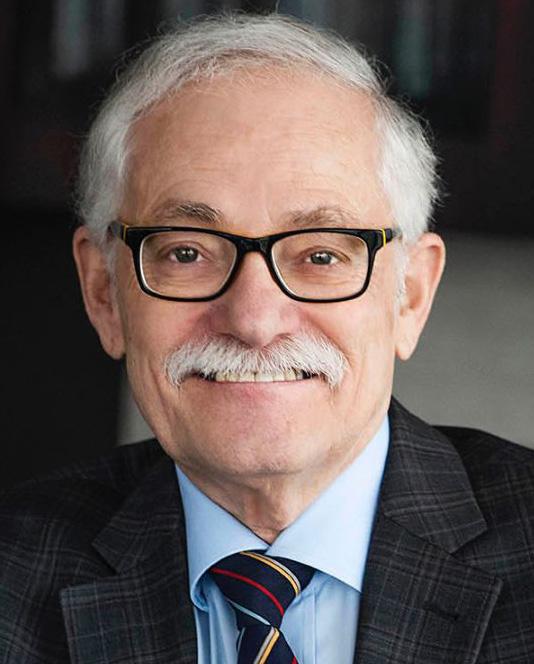
Mentoring, then, becomes more critical than ever for a firm’s future success.
At Mann Lawyers, the firm brought on K. Scott McLean, a former partner at a large international law firm, for the express purpose of establishing a mentoring program and structuring training programs. Even the firm’s compensation model, which is based on a “holistic pie” rather than crediting where work has come from, has a role in retaining and training its cadre of young lawyers.
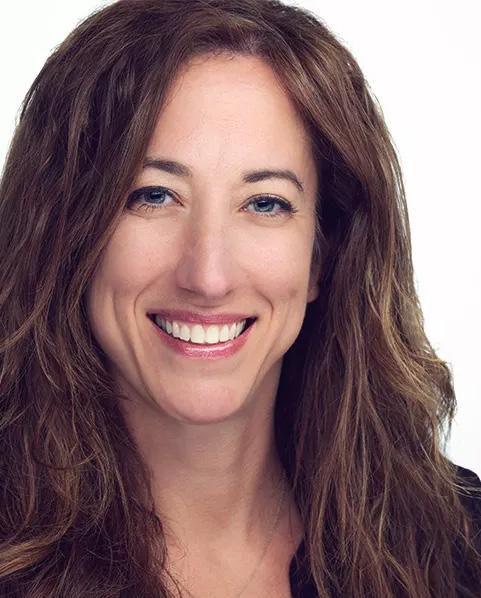
“Our compensation model affords us the time to teach,” says Martin. “It’s

WINTER 2023 | 33
Thomas Frohlinger Managing Director PKF Lawyers
André Martin Co-Managing Partner Mann Lawyers
Lyanne Winikoff Partner Greenspoon Winikoff S.E.N.C.R.L., LLP
I
Howard Greenspoon Co-Founding Partner Greenspoon Winikoff S.E.N.C.R.L., LLP
an incredibly good investment of time because if you don’t have that younger generation coming up behind you and if they’re not as skilled, then the firm’s continuation and succession will be in jeopardy. So, we take all that very seriously.”
The key is hiring the right people from the outset, says Howard Greenspoon, a cofounding partner at Greenspoon Winikoff, a lean and efficient boutique firm that works with a lot of clients in the IT and biotechnology industries.
“When we’re all on the same page at the beginning, there’s a lot greater likelihood you’re going to be able to retain that person,” Greenspoon says. “Part of the recipe is finding the right person,” agrees Winikoff. “Sometimes it takes a while.”
Greenspoon and Winikoff look for young lawyers with the necessary skill set and for whom work-life balance is an important factor in relation to compensation.
“We want to work hard, but we want to have balance in terms of quality of life,” says Greenspoon, who has experience at a large law firm. “We have families and other personal interests. That tradeoff is very attractive to young lawyers, today especially.”
Younger lawyers also are drawn to Greenspoon Winikoff by the opportunity to gain practical experience quickly.
“Our teaching method is a little different,” says Winikoff, who earned her
law degree from McGill University in 1997. “With us, you hit the ground running in terms of working directly with the client, directly with the lawyer who’s responsible for the file. Our learning curve is much steeper. The young associates appreciate that. They want to get in, they want exposure.”
Despite anyone’s best efforts at hiring, however, holding on to young lawyers who feel the pull of larger firms is a constant struggle at many small to mid-size firms –whether in the U.S. or Canada.
“We do such a good job with mentoring young lawyers that sometimes the price to pay for that is they get poached,” says Greenspoon. “It does hurt after you’ve invested so much time and patience in teaching them when a young lawyer says he or she wants that big firm experience.”
For each of the Canadian firms, culture

is central to attracting and retaining good talent.

“I guard our firm’s culture very zealously,” says Frohlinger, who touts the firm’s inclusivity and diversity.
Among its 40 or so lawyers, they speak and conduct business in 12 languages. The diversity is by design, he says.
Frohlinger emigrated from Hungary when he was 11 following the Hungarian Revolution in 1956. He and his mother arrived in Montreal where she got a job as a hairstylist and within months had purchased the salon. Frohlinger made his way to Manitoba to work on a hydroelectric project after studying geology and mining at McGill University. In 1978, he earned his law degree at the University of Manitoba.
“My goal as a lawyer is that I don’t want to be just a hired gun,” he says. “My
34 | THE PRIMERUS PARADIGM ™
Perth, Ontario
Winnipeg, Manatoba
ideal role is to be my clients’ trusted adviser.”
Greenspoon Winikoff, which is evenly made up of anglophone and francophone lawyers, defines itself as being personal and approachable, and strives to maintain a warm and friendly atmosphere.
“We take work very seriously, but you have to like coming to work and you have to like the people you’re working with,” says Winikoff. “We try very hard to make that a point in terms of our firm culture and we pride ourselves on that.”
Martin, who is the leader of the Business Law Team at Mann Lawyers, says the firm has in the past declined to hire accomplished attorneys with significant books who they felt wouldn’t be a good fit with the firm’s culture.
“What I love about the firm is that rather than focusing on business – and I’m a business guy, that’s my role here – the focus is really on the people.”
He admits that when he first joined the firm for a 5-year stint soon after passing the bar, the focus on people seemed a little foreign to him, but he soon discovered how gratifying it felt to help people – and not only clients, but other members of the firm. It is what brought him back to Mann Lawyers after a brief venture with a larger firm where he felt like a square peg in a round hole. The sense of gratification he’d experienced at
Mann was a feeling he couldn’t shake, and, like Frohlinger, Martin is vigilant about protecting the firm’s character.
“I’ve spent 12 years as a partner making sure the firm keeps that culture,” Martin says.
Part of ensuring the firm’s culture isn’t corrupted as it continues to grow (once only four attorneys, Mann Lawyers is now one of the largest firms in the region) requires an external focus and an internal one, says Martin.
Externally, the firm needs to “have its gates up,” which means bringing in the right people even if it takes longer. The internal focus starts with the leadership, says Martin.
“You have to pay attention to who everyone is and get to know them,” Martin explains. “You surround yourself with likeminded people who care and you can achieve a certain synergy.”
The firm provides team-building opportunities such as retreats where family members also are invited.
Martin’s emphasis on building relationships within the firm to ensure the integrity of the practice mirrors Frohlinger’s approach to firm management.
“Management is a human process,” says Frohlinger. “Everybody’s unique. Everybody has to be treated as an individual rather than as a group.”
Each of the firms finds value in
the Primerus™ network and hopes to eventually expand membership into the other provinces, according to Frohlinger, and through the Canadian Practice Group they work to spread the message that business opportunities abound in Canada.
Primerus™ allows the firms to broaden their reach, both into the U.S. and further abroad.

“The reason why we joined [Primerus™] is that we have a very diverse client base and they do work all over the world,” says Martin. “We were consistently struggling with finding lawyers to refer these clients to and it was frustrating. That was the biggest driver for us. To get into a network with other firms that shared the same type of values as we did, that focused on the same types of clients.”
The attraction for Greenspoon Winikoff was essentially the same.
“It is a real tangible benefit for us to have the ability to pick up the phone and call an attorney in Florida and say, look, we have a client, can you help them out. And with confidence know our client is going to be in good hands,” says Greenspoon.
It’s a comment echoed by Winikoff.
“Primerus™ members consider us to be members of their own firm,” says Winikoff. “You’ll get the same responsiveness, the same quality of service that we would expect from ourselves.”
WINTER 2023 | 35
Montreal, Quebec
Surprise court appearance altered career trajectory of New Delhi attorney
By Brian Cox
ttorney Mani Gupta unexpectedly discovered her calling as a litigator “one fine day” in February 2013.
“I feel it was the most life-changing experience that ever happened to me,” she says. “In the blink of an eye, it was something that just clicked.”
As a young attorney, Gupta had primarily engaged in corporate transactional law since graduating from the National Law School of India University, Bangalore. But one day while she was on a month-long sabbatical from

New Delhi-based Sarthak Advocates & Solicitors, a client requested that she represent him in a contract dispute. She initially declined, explaining that she was not a litigator and had never argued in court before. The client was insistent, however, and Gupta finally threw up her hands and agreed. She remembers driving to court and calling colleagues to ask questions about what she should expect.
“I did not even have a black coat of my own to wear,” she says, noting that attorneys appearing in court in India are required to wear black jackets – black gowns are optional. “I had to borrow my husband’s. I knew it was ill-fitting, but it was only going to be a one-day thing.”
She may have been right that the jacket was ill-fitting, but she was wrong about it being a “one-day thing.” The experience that day dramatically altered her career path.
“Somehow, I really enjoyed myself,” she says. “It required a lot of thinking on one’s feet and interacting with people.”
She says what really helped her “sink her teeth” into the new role was that the judge ruled against her. She was outraged at the injustice. It lit a fire, and she felt compelled to correct matters. She told her client, “Here is the judge’s order, and I think we need to challenge it.”
36 | THE PRIMERUS PARADIGM ™
A
She did and the appellate court agreed with her.
“I haven’t looked back,” she says now, nearly 10 years later. “Every day that I have been in court I have 100 percent enjoyed myself. I’ve never had a bad day in court.”
She returned to Sarthak Advocates & Solicitors with a new purpose, feeling revitalized about her career in law, and the firm proved supportive of her decision.
“It took a lot of people reposing their trust in me,” she says. “They realized I was struggling to enjoy corporate law, and that struggle was making it difficult for me to stick with it.”
She is upfront with clients that she has never held a litigation internship or a judicial clerkship.
“People have to make their bet based on what I know about how contracts work,” she says. “I tell them if you take a bet on me, I promise you that there will be a hell of a fight. And I think that’s what clients want.”
In 2020, Gupta was recognized as one of the Top Dispute Lawyers by the Asian Legal Business, which compiles an annual list of the 40 top lawyers in the dispute resolution field in the country based on their work, market feedback, and client recommendations.
Gupta’s practice is focused on commercial law, involving arbitration and contract disputes. Her work primarily involves domestic arbitration in the construction space, the power and energy space, and the roads sector. She often is litigating against government entities.
Sometimes reluctant to network because she can be impatient with small talk, a colleague once advised her that “good work speaks for itself,” and Gupta says she has found that to be largely true. A first-generation lawyer, Gupta grew up in New Delhi where her father was
a public servant and her mother was a homemaker who spent much of her time taking care of her older brother who struggles with mental health issues.
“That experience caused me to mature at a very young age,” says Gupta. “It required me to grow up sooner than I would have.”
At the time, there was far less acceptance and understanding of mental health problems and her brother’s illness was considered almost a family secret.
“When I look back, I think that’s something in my childhood that’s really defined how I think of others, how I want to treat them, and how I wish to be treated,” she says.
Another foundational influence on Gupta’s personal and professional development is the school she attended in New Delhi. Sardar Patel Vidyalaya is a private school started in 1958 that Gupta
describes as an alternate system of education in terms of the type of values it tries to instill in students. It emphasizes experiential learning and not engaging in aggressive competition.
“That kind of life philosophy has helped me to see that we all come with some sort of baggage,” says Gupta. “We all have different start lines and we all might have different finish lines, but, ultimately, we need to measure our own life’s marathon and not test it against somebody else’s yardstick.”
She sees her distinct education at Sardar Patel Vidyalaya and the experience of dealing with her brother’s mental illness as two pillars supporting how she approaches life and her profession.
“I think it’s played a very significant part in how I perceive myself as a lawyer
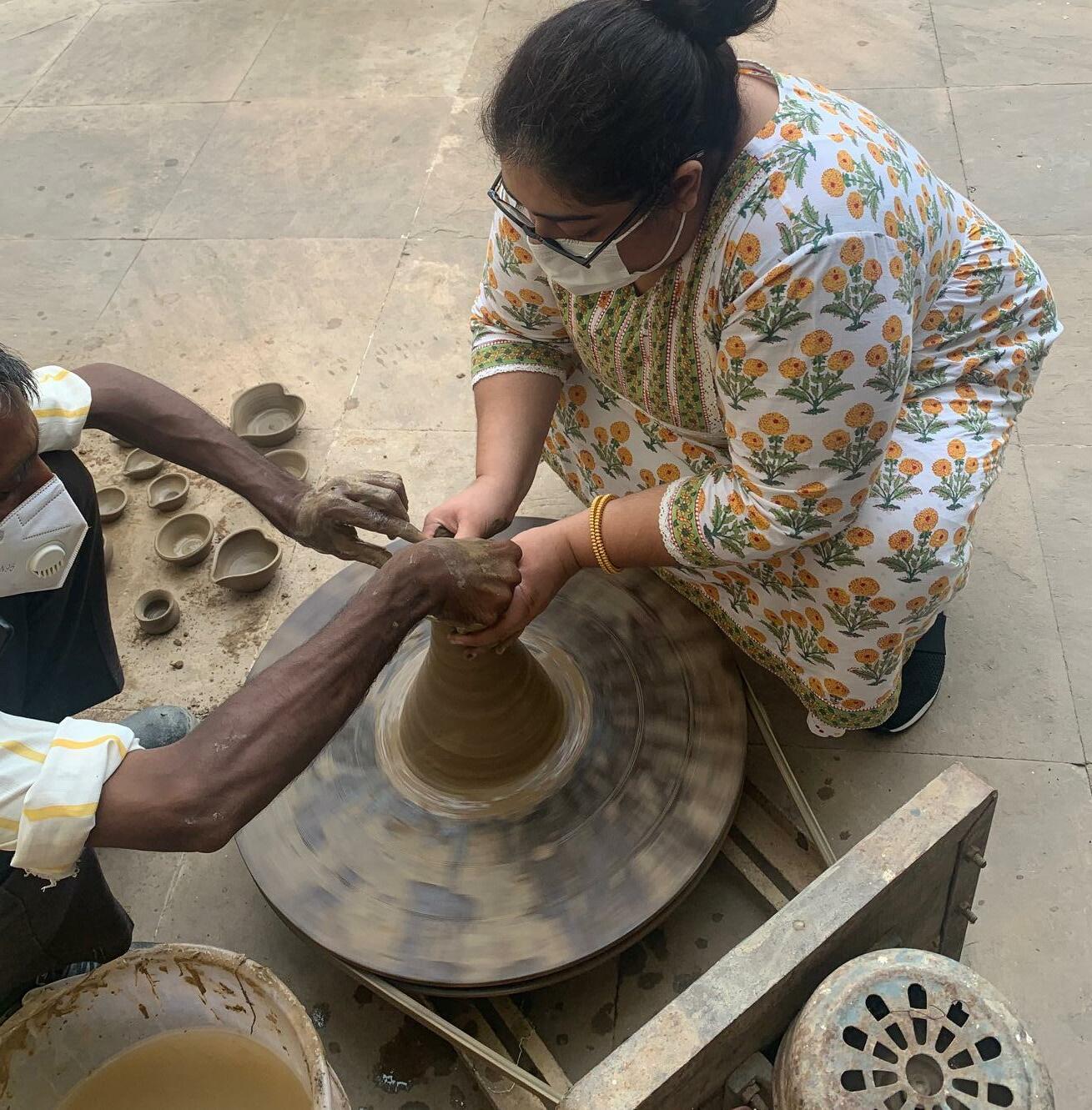
WINTER 2023 | 37
Pottery is a passion for New Delhi attorney Mani Gupta.
and in how I approach life situations, as well as situations with clients,” she says.
It was an approach that proved invaluable in law school as well.
In India, National Law Universities offer undergraduate students a 5-year integrated law degree program that qualifies them upon completion to sit for the bar. Gupta enrolled at the National Law School of India University, Bangalore, just months after turning 17. The law school was the first established in India to offer the rigorous undergraduate law degree.
“Frankly, in my view, that’s a very early age to take on something as challenging as the study of law,” says Gupta. “I wish I had done my law degree at a later point in time.”
Initially, law school was a taxing challenge for Gupta as she gauged the demands of the program and the hectic pace many of her fellow students maintained. She sometimes questioned whether she was qualified to be in the program and wondered whether or not it was the right choice for her.
“For me, law school was a very downward journey first and then it was a very upward journey,” she says. “Once I was at peace with who I was, I was able to make sense of the world around me. I said, I don’t care what others are doing. I will do what I like doing. I was able to come into my own. From that point onwards, the journey was better.”
Gupta graduated in 2008 and joined Luthra & Luthra Law Offices, a large and prominent corporate law firm in New Delhi. As a young associate, she was entrusted

early on to take part in a complex transaction that involved Laureate Education Inc. – one of the world’s largest for-profit universities – wanting to acquire a higher education institution in India. One of the significant challenges that needed to be resolved was that higher education in India is a charitable activity: How then do you implement a structure where a profit-making entity from the U.S. can acquire a not-for-profit entity in India? Gupta says it was the first deal of its kind in the country.
“At a professional level, I was lucky enough that I got to work with some very good people,” she says.
Personally, however, she was having some difficulty with the firm’s culture and some colleagues, who took issue with
38 | THE PRIMERUS PARADIGM ™
“this new kid who has her own opinion on everything.” She considered leaving at times, but she was determined to see the Laureate deal through to a close.
It took nearly two years, but at the end, “the last man standing was Mani,” she says with a special sense of satisfaction.
“From being the one who was basically fetching everyone their coffees to being the one who was ultimately the only one on the team who knew how the deal had evolved, it was a terrific journey,” says Gupta. “It was about persevering. Saying, ‘no matter how much you bleed me, I’m not moving from here.’”
With the transaction completed, Gupta left the firm soon after in 2010. The work had taken a significant toll on her physical and mental health and she was ready to spend her days playing tennis and learning pottery – but she found the allure
of law too strong and after only three months, she joined Sarthak Advocates & Solicitors as a senior associate. Three years later, she made partner.
She is now a key architect in the firm’s culture. The firm is a signatory of the Mindful Business Charter, which purports to provide a practical framework to remove unnecessary sources of stress and promote better mental health and wellbeing in the workplace. Gupta recognizes that the pressures faced by today’s lawyers are different from the ones faced by earlier generations.
“I think that what a lot of people think is ‘mentoring’ is essentially them not being willing to change structure or the hierarchy of working,” she says.
She is an outspoken advocate on issues surrounding the mental well-being of lawyers. And as a way to engage in deeper conversations about mental health in the legal profession, she co-founded a
social media platform called Samvedna, which translates to “sympathy” in English.
Last year, she was interviewed on the podcast “The One Take Show: Law, Logic and Life” hosted by Kaustubh Srivastava where she discusses factors that exacerbate mental health issues for attorneys. She calls for an acknowledgment that too often attorneys’ workloads are too great and timelines are unrealistic. She wants to see the profession make “small tweaks that lead to a happier legal fraternity.”
“My experiences as a caregiver for my brother and my own mental health struggles are something that deeply affected how I see law and how I see the profession,” she says.
Gupta and her husband, Abhishek Nath Tripathi, who is the managing partner at Sarthak Advocates & Solicitors, have been married 14 years and have two children. Their son, Aniruddh, whose name means “unstoppable,” is 5, and their daughter, Radhika, is 4.
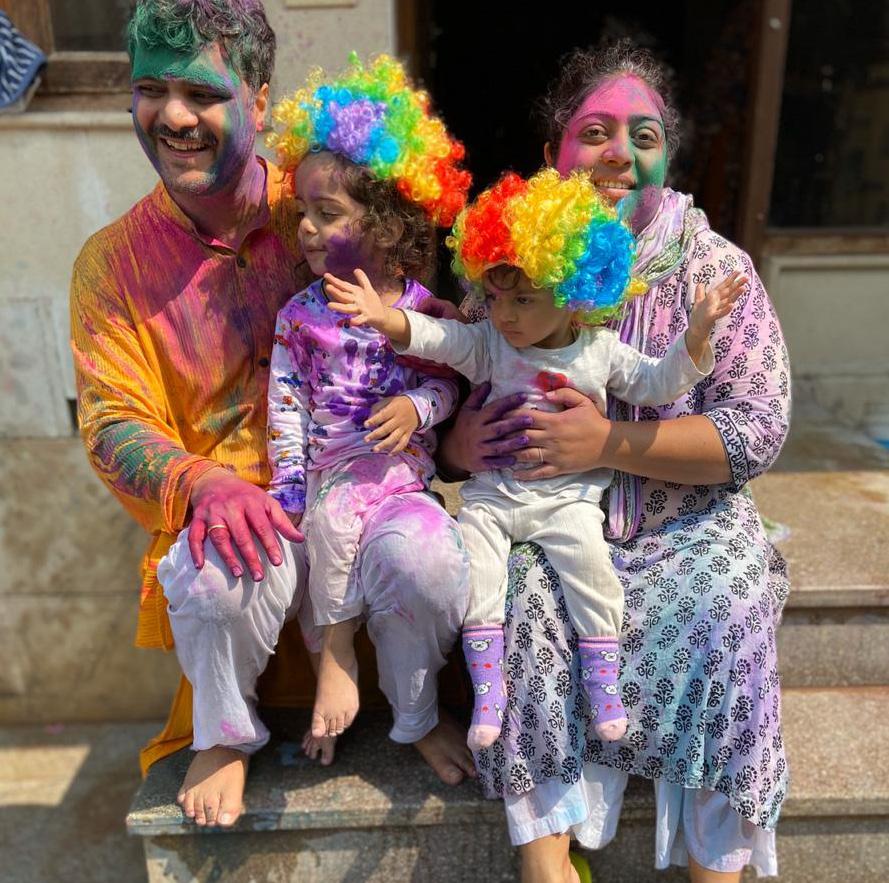
In her spare time, which isn’t much, Gupta would like to return to pottery. She was drawn to the craft because she found it mesmerizing to watch how the clay moves on the pottery wheel.
“There’s a process called centering in pottery where when you put the clay on the wheel, it deviates away from the center of the wheel. With your hands you have to center it,” she says.
“I found it reflective of our life and what our souls go through. What life throws in our way always takes our mind in different directions, but to be able to be of any useful value we have to bring our minds to a centered safe zone and say ‘now I’m going to get down to what I need to do.’ Centering is very important.”
WINTER 2023 | 39
Family life is a joy shared by Mani Gupta and her husband, Abhishek. The couple has two children, son Aniruddh and daughter Radhika.
Embrace Equity Soviet refugee found her legal passion in a new promised land
 By Brian Cox
By Brian Cox
40 | THE PRIMERUS PARADIGM ™
hen attorney Karina Sterman
was a young girl in Moldova, which was part of the Soviet Union at the time, she remembers her father bringing flowers home to her and her mother in celebration of International Women’s Day. She remembers parades honoring March 8 as a national holiday. It was a big deal.

Years later, after her family had immigrated to the United States, she was surprised to learn few Americans had heard of International Women’s Day, let alone celebrated it. On occasions at work when she brought up the idea of recognizing the holiday, she was greeted by crickets.
“How come nobody here celebrates it?” she wondered.
The irony is that International Women’s Day has its roots in the U.S. The first National Women’s Day was held in New York City in 1909 and attracted thousands of women, many of whom were involved in suffragist and socialist causes. The concept caught on in Europe and the first International Women’s Day was organized two years later, drawing more than a million people to rallies worldwide. Today, it is celebrated in more than 100 countries and has been made an official holiday in more than 25.
“It was meant to be for people who work in order to band together and have some rights,” says Sterman, a partner at Greenberg Glusker in Los Angeles. “I’ve always felt an affinity towards that. I very much support that.”
Now, as chair of the Primerus™ Women Lawyers Section, Sterman hopes to bring more attention to the day and encourage her colleagues to take part in recognizing the social, economic, cultural and political achievements of women. This year’s theme is “Embrace Equity.”
“We shouldn’t even need to have an International Women’s Day because it should be so ingrained in our society that women do have equal rights and they
yourself. You don’t let people walk all over you. You don’t pick fights, but you don’t shy away from fights.”
She says she is “perpetually inserting myself when I think someone has been wronged unjustly. That’s the part that really gets to me.”
With that fighter’s spirit, Sterman has spent the majority of her legal career as a litigator, defending businesses in class action lawsuits as well as in discrimination, retaliation, wrongful termination, and other employment disputes. But she has been an advocate since long before becoming a lawyer –when from a very young age she acted as her parents’ interpreter after the family arrived in America knowing no English.
Sterman was 9 when her family was among 10,000 people permitted to emigrate from the Soviet Union through a national lottery. Her parents decided it was time to leave when the antisemitic community somehow found out that they were Jewish – a secret her parents had worked hard to keep for years, not even telling her out of fear for her safety –and life had become untenable, even dangerous.
do have equal say and they are an equal member of society,” says Sterman. “Until that day, we do have to remind people, at least one day a year.”
Fighting for equity comes somewhat naturally to Sterman. There’s a bit of a pugilist’s DNA in her. Her father was a boxer when he was younger and for her fifth birthday, she remembers receiving a small pair of boxing gloves.
“It was inculcated in me,” she says. “You stand up for people. You stand up for
Idel and Victoria Sterman arrived in the U.S. with their daughter in April 1980, flying into New York City. They brought their life savings — $415, all they had been allowed to take with them. They shared their first American meal in the hotel restaurant, and because they couldn’t read the menu, they ordered the cheapest item listed – a slice of chocolate cake. Nine-year-old Sterman was delighted; her mother less so.
WINTER 2023 | 41
W
Karina Sterman in her youth.
The next day the family was flown to Columbus, Ohio where they were provided an apartment that had two stories –all to themselves. They were amazed. Sterman remembers their first trip to the supermarket and seeing an entire aisle dedicated to toilet paper. They were overwhelmed by the selection.
“It was unfathomable to us, the level of choice,” says Sterman. “It felt like some big prize. It was so different from our experience in the Soviet Union where you had to stand in line for the toilet paper and a separate line for the chicken.”
Sterman began attending the Columbus Torah Academy where she learned English as well as Hebrew. She was given a scholarship, but it didn’t cover the entire cost and her parents had to sacrifice to meet the remaining tuition.
“Education was really the only thing we had,” says Sterman. “They were constantly trying to teach me something.”
Sterman spent her first summer in Columbus picking up English at the community pool and by the time school was back in session, she no longer needed classes in English. She still has the little
pocket English-Russian dictionary her family used from those early days in Columbus.
The Stermans may have likely remained in Columbus for the foreseeable future if not for the discovery of a letter hidden away in a drawer, the investigatory skills of a distant relative, and a phone call from the west coast.
The letter was one Sterman’s parents had written years before to a relative in Los Angeles and the woman’s adult children discovered it in a drawer when she died. After having the letter translated, an aunt who was passionate about family connections tracked the Stermans down in Ohio and called to ask if she and her husband could come visit.
As it turned out, the Stermans had a whole passel of extended family living in Los Angeles who were thrilled to learn of their existence. Soon after, they flew to Los Angeles to attend a cousin’s bat mitzvah and after a two-week visit, Sterman’s mother had made up her mind: They were not going to continue living in Columbus. “These are good people,” she said of the giant West Coast city. “We should be able to make a life here.”
“My mother is a bit of a force,” says Sterman with a laugh.
So Sterman’s father stayed in L.A. to find a job while she and her mother returned to Columbus to pack up their worldly belongings. They rented a U-Haul truck and drove their Ford Zephyr across the country to start another new life in another new city, but this time surrounded by family.
Her mother found work as a bookkeeper at a company where she is now the chief financial officer.
Sterman went on to study literature and women’s studies at UCLA. After college she considered earning a Ph.D. in literature, but she decided instead to attend University of Southern California Gould School of Law. It was a natural calling, actually. By the time she went to law school she had already spent untold hours volunteering at juvenile detention centers, with literacy programs, and in children’s rights centers.
“That was just what you did. You helped people that needed the help,” she says. “The advocacy part always felt intuitive to me.”
After graduation, she took a position with a small law firm that specialized in securities litigation because she was “chomping at the bit” to gain courtroom experience. From her first courtroom appearance – a summary judgment she was granted based solely on her written motion – Sterman had caught the litigation bug.
“I thought it was exciting,” she says. “I loved the legal research, the writing, the legal strategy.”
She did eventually find securities litigation too insular and redundant, however, and so accepted a position with the Beverly Hills firm of Ervin Cohen & Jessup where she could pursue general business litigation and employment law.
She was with the firm for 16 years, eventually becoming an equity partner,

42 | THE PRIMERUS PARADIGM ™
Attorney Karina Sterman traces her roots to Moldova.
before joining Greenberg Glusker six years ago, where she has found an additional level of support for her clients and a different level of autonomy for herself in terms of steering her practice.
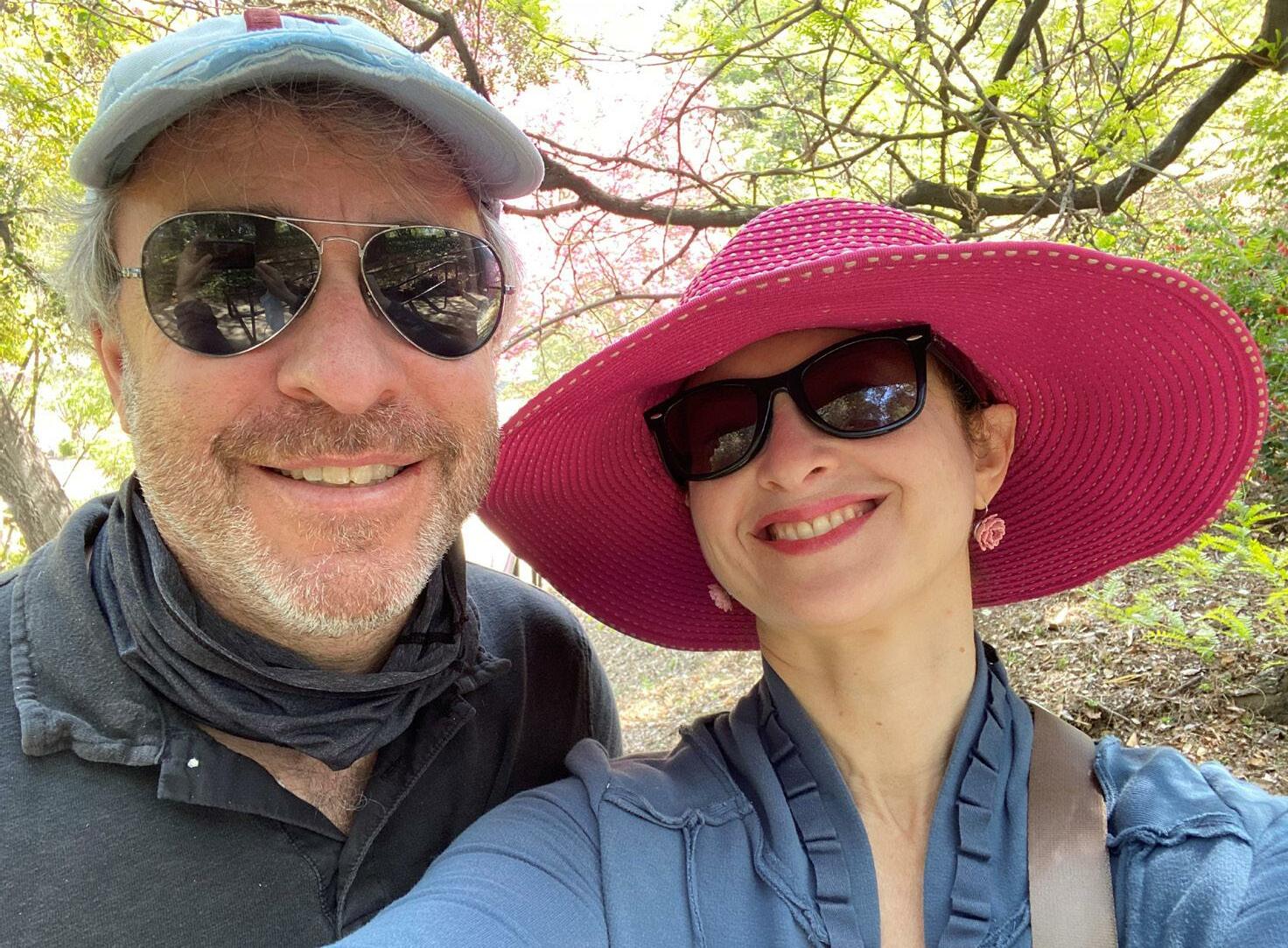

She and her husband Joshua Goode, a professor of cultural studies and history at Claremont Graduate University, have two children. Their son, Milo, is a junior at Tufts University in Massachusetts where he is studying international relations and is a member of the varsity track team. Their daughter, Anabel, is a senior at Marlborough, an all-girls school in Los Angeles, and she is currently interested in policy and international diplomacy.
Sterman says she is now interested in reigniting her passion for being part of the legal community. She is the former District 7
governor of California Women Lawyers, a women’s legal rights advocacy group and is currently on the Diversity in the Law Committee for the Los Angeles County Bar.
And she is dedicated to mentoring younger attorneys, though she can’t say she had any mentors as a young woman lawyer.
“The few women who were senior lawyers, basically their advice was toughen up and develop a thick skin,” she says. “They said if you want to be treated equally and treated with respect, don’t point out constantly that you’re a woman.”
Sterman characterizes it as mentorship by abdication. She had to develop her own style. She encourages young attorneys to not always look for wrongs, to give people a break and to remember that not everyone comes from the same background or culture.
“I could have benefited from active mentorship,” she says. “All younger attorneys can benefit from active mentorship. Somebody who reaches out proactively. I’m a strong proponent of that.”
Greenberg Glusker has created a program where they match senior attorneys with junior attorneys, and Sterman said she “loves empowering younger lawyers.”
She believes in dialogue and discourse and not writing people off – not even opposing counsel.
“As long as we can keep talking, we can find some reminder that we are both human beings and our dispute is not about ourselves individually and that’s really, I think, the kind of mentoring all lawyers need – that it’s not about themselves,” she says. “It’s about representing your clients and the interests and rights of your clients.”
WINTER 2023 | 43
Karina with her husband, Joshua Goode, in a favorite photo.
Above: The beauty of the Butler House was enjoyed by Karina and her husband during a visit to Kilkenny, Ireland.
First rate Chicago attorney relishes his leadership role at firm
 By Tom Kirvan
By Tom Kirvan
44 | THE PRIMERUS PARADIGM ™
It’s been said that the best adventures start when you least expect them.
For Chicago attorney James Whalen, the saying served as the kickstart to a career as a successful litigator who has doubled as the managing partner of Lipe Lyons Murphy Nahrstadt & Pontikis Ltd. over the past three years.
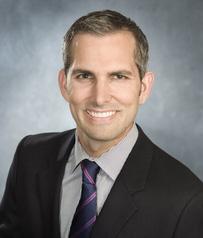

The year was 2005 when Whalen, as a young associate with another Chicago firm, was hip deep in work late one afternoon. “As he was leaving the office for the day, one of the partners stopped by and asked somewhat casually, ‘How would you like to try a case tomorrow?’ Of course, I said yes,” Whalen says in recalling one of life’s game-changing moments. “I assumed that the partner wanted to see how I would handle the pressure. I decided the best response was to go all-in.”
The next day, as he began his maiden voyage as a trial lawyer, Whalen spotted a familiar face in the courtroom – the partner who provided the legal ticket for the young associate’s first bench trial.
“He sat down in the front row to watch me in action,” Whalen recalls vividly. “At first it was a bit unnerving, but once the proceedings got moving, I felt good. In fact, I was confident in how the trial was going until I glanced back at him and saw a big smile on his face. In the moment I did not know how to read it. However, he later told me that he was reliving his first trial through me.”
Fortunately for Whalen, it also portended a convincing victory in a breach of contract case that took less than a day for the judge to decide.
“It was an uplifting experience as it gave me an early shot of confidence that I had what it takes to be successful in court,” Whalen says.
Years later, that feeling would be reinforced when Whalen was in the thick of defending a personal injury action brought by a plaintiff seeking millions of dollars in damages.
The case produced more than 10,000 pages of documents that Whalen had to sift through, including one entry that didn’t jibe with the raft of other materials in the high-stakes suit.
“There was something suspicious that caught my eye in one document, where the plaintiff’s mailing address didn’t line up with all the other materials we had received,” relates Whalen, who soon discovered that the plaintiff was masquerading as someone else.
With his suspicions confirmed, Whalen then began a line of questioning “to see how committed the plaintiff was to his story,” which eventually began to unravel through Whalen’s persistent interrogation and relentless discovery efforts.
“We discovered that he had been living a life under someone else’s identity for 10 years and that the man whose identity he was using never knew that anything like that was happening,” says Whalen, noting that his client received an extremely favorable settlement. “It was a bizarre case, but one that taught me an important lesson about being thorough and persistent.”
Those qualities are currently serving him well as the managing partner of Lipe Lyons, an 18-attorney firm that marked its 10th anniversary earlier this year. The firm was formed by the five named partners and specializes in defense work in the areas of general liability, commercial litigation, construction defects, insurance coverage and bad faith, labor and employment, product liability, professional liability, and transportation.
WINTER 2023 | 45
Managing partner of Lipe Lyons, James Whalen is a member of the firm’s tort defense, commercial litigation, and product liability practice groups. He has been recognized by Crain’s Chicago as one of the “Notable Gen X Leaders in Law.”
Whalen was elevated to the position of co-managing partner of the firm in 2019, sharing the leadership responsibilities with Brad Nahrstadt, one of the five founding members of the firm who planned to retire the following year.

“My partners have been instrumental in giving me an opportunity to lead the firm,” Whalen relates. “In particular, Brad offered me much guidance on how to lead while letting me develop my own style. I was and continue to be incredibly grateful for the opportunity to shape the firm alongside my partners. It has been challenging and rewarding, as we have and continue to grow in size and discipline.”
What he couldn’t anticipate, however, was what approach to take when suddenly faced with the assorted challenges posed by a pandemic.
“The first few months as the sole managing partner were fun and exciting and then came COVID, which sent us all into a world filled with uncertainty,” Whalen recalls. “I like to jokingly ask, ‘What did Brad know at the time’ and ‘What stock trades did he make on 3/9’ before the pandemic really hit.”
A healthy sense of humor served as one way for the new managing
partner to cope, as did the help of the firm’s partnership team that was firmly committed to keeping every attorney and staff member at Lipe Lyons fully employed.
“Right from the outset, we were determined to keep things intact and to avoid any layoffs that would force people to look for work during a global pandemic,” Whalen explains. “We did our best to assure everyone that we had their best interests at heart and that we had the wherewithal to survive the pandemic. In retrospect, I think all of us take pride in knowing that we were able to do just that.” It helped that the firm had already begun transitioning to a remote work model months before COVID-19 turned the world on its ear, according to Whalen.
“We were well-positioned for that pivot, almost to the point that it was a natural progression,” he says. “Now, it’s a basic part of our business model, although we have tweaked it a number of times in the past two years to make it even more effective and efficient for both employees and clients.”
A graduate of Indiana University, Whalen grew up in Hamilton, Ohio, a city of 63,000 residents located a half-hour north of Cincinnati. The youngest of three sons, he drew legal inspiration from his
maternal grandfather, Hjalmar Persson, who became an attorney before the outbreak of World War II.
“After the war, he came back to practice in Hamilton and was so well known and respected that he became an institution in our community. Eventually ‘Hjalmar’ had single name recognition around town,” says Whalen, who treasures a collection of recorded interviews he made with his grandfather in the years before he died in 2000. “I used to tag along with him all the time when I was growing up, and I eventually came to understand that he personified what becoming a lawyer was all about. He was supremely wise and had a great deal of integrity, which allowed others to trust him and his word.”
Whalen’s parents, Karen and Jack, are both retired and still live in the home in which their three boys were raised. “My dad was a financial adviser, while my mom worked at various community nonprofits over the years,” says Whalen. “They have and continue to invest a great deal of time and energy into the betterment of the community. They have been great role models for my brothers and me. Despite their retirement, they
46 | THE PRIMERUS PARADIGM ™
are busier with their community efforts than ever.”
His oldest brother, Jon, is an attorney in Hamilton, specializing in business, estate planning, and real estate work at the same firm where their grandfather Hjalmar worked decades earlier. Whalen’s brother, Jared, was an acclaimed chef in the Cincinnati-area before unexpectedly dying in 2018 at the age of 44.
“His death was a shock and came just hours after I had seen him at a surprise 40th birthday party my wife threw me in Hamilton,” says Whalen. “He had an outsized personality, and boundless creativity and curiosity, and certainly influenced both my interests and how I see the world.”
Married and the father of three school-age daughters, Whalen and his wife, Natalie, met as students at DePaul University College of Law.
“Among other things in common, we share the same birthday,” Whalen says of his wife, an attorney for the Chicago Mercantile Exchange who also serves as the unofficial “managing partner” of the couple’s busy household.
“She has had a very interesting legal career, working first as a prosecutor at the
Office of the Cook County State’s Attorney before going into private practice and now with the Mercantile Exchange. She is brilliant and has been a great life partner and a terrific sounding board for me all the years that I’ve known her.”
Licensed to practice in three states, Whalen took the bar exam in Indiana under somewhat unusual circumstances in 2016.
“My wife was pregnant with our third daughter at the time and was due any minute, so I gave the test administrators a heads-up that I might be getting a call during the exam,” he recalls with a smile. “Fortunately, our daughter waited until the test was over – she graciously waited 4 hours after the exam to join our family!”
The couple’s three children – Tillie (10), Caroline (8), and Ainsley (6) – are joyful reminders to Whalen of his commitment to make Lipe Lyons a “firm that can attract diverse talent and thrive in a fast-changing world.”
“As part of a two-attorney household, I’m very conscious of the demands of both work and home,” says Whalen. “Inherently, being a lawyer is hard work in terms of the hours we spend and the responsibilities that we hold. On the other hand, I also want to ensure that our firm
provides opportunities for professional growth that acknowledges the demands of life outside of the office. We strive to merge meaningful law firm traditions with policies that reflect what a law firm should be for its employees. In turn, investing in our employees supports our mission to provide our clients with the best possible representation.”

Whalen, who graduated from Indiana with a history degree in 2000, became acquainted with Primerus™ somewhat unexpectedly in 2014 when he subbed for one of his colleagues who was scheduled to deliver a speech at a program presented by the organization.
“I gave the speech that he wrote and soon saw the value that Primerus could bring to my practice and my growth as an attorney,” Whalen says. “I initially became involved in the Young Lawyers group of Primerus, chairing its Executive Committee and later serving on the Primerus Defense Institute Executive Board. Primerus firms and attorneys have been enormous valueadds to our firm and our clients. We have global reach and a wealth of expertise at our disposal, and we regularly make use of these assets to help our clients.”
WINTER 2023 | 47
Belief system Personal injury lawyer stays true to his Wyoming roots
By Brian Cox
The logo for the Gary L. Shockey, PC law firm is essentially only two simple brushstrokes: A blue line that peaks to represent the Teton Range, and a V-shaped black line that conveys a bird in flight. The minimalist design evokes the veteran personal injury lawyer’s abiding roots in Wyoming.

The third-generation Wyomingite’s family moved to the state from northeast Nebraska in 1917 to settle a homestead
around 30 miles from Casper, where Shockey now makes his home. During the Great Depression, his grandfather and father worked in area coal mines and shot jackrabbits for bounty to get by.
“They did anything they could do to survive,” says Shockey. “My dad hated to talk about it because they were such hard times.”
In the 1940s, the family moved to Casper where his father would later start a small fencing company and Shockey remembers working with his father as
soon as he could help carry tools. They lived in a small house that had been a part of the original homestead and relocated to Casper. Money tended to be tight, and life was sometimes difficult.
A bright student who had early dreams of becoming an astronomer, Shockey graduated from high school in 1969 and he had several options for higher education. Ivy League schools were liberalizing their admissions policies and trying to diversify their student body. A brainy kid from
48 | THE PRIMERUS PARADIGM ™
Wyoming was an ideal prospect. Shockey chose the offer from Yale, which was a financial godsend.
“I didn’t even know how I was going to pay to go to the University of Wyoming, if I could do that,” recalls Shockey.

His Yale alumni sponsor told him that when he arrived at the school in New Haven, Connecticut, he was going to find himself with students who had attended preparatory schools and were far more familiar with the Ivy League academic
environment. “You might find yourself a little bit behind, but you’ll catch up,” he assured the young Shockey.
“And he was right. I caught up,” says Shockey. “I loved my time at Yale. I wouldn’t trade those four years for anything, but I also knew by the end of it that I wanted to come back to Wyoming and live back here where my roots are.”
He enrolled at the University of Wyoming College of Law knowing that he wanted to help people and that he aimed to do it in a courtroom.
“I didn’t care for law school all that much,” admits Shockey. “There was little consideration at the time in law school about the human effect of the law – what it’s like for a person to be charged with a crime or what it’s like to be injured through no fault of their own and then have the weight of the insurance industry against them.”

WINTER 2023 | 49
Gary Shockey
A summer internship with fellow Yale alum Bob Schuster was Shockey’s first experience with personal injury law. The following summer, he again connected with Schuster for an internship, but by then Schuster had joined with Gerry Spence and Ed Moriarity to form Spence, Moriarity & Schuster, a firm that would quickly gain national prominence for its
success in complex civil and criminal cases. It was an internship that would shape Shockey’s legal career for the next 25 years.
After gaining valuable experience working as a public defender for a year following graduation, Shockey joined the newly formed Spence, Moriarity & Schuster. He and his wife, Dona, made the difficult decision to move from Casper
where they had deep family bonds and wide community ties — to Jackson Hole, which is on the west side of the state, just south of Yellowstone National Park.
Working at a high-profile law firm offered a tremendous pool of potential cases. At times, the demand overwhelmed the firm’s capacity, which meant tough decisions had to be made.

50 | THE PRIMERUS PARADIGM ™
“Gerry’s public image of helping the little guy meant that everybody thought we were able to do that,” says Shockey. “It was just heartbreaking to say no to so many people who called up and wanted help because we just couldn’t do it.”
Making partner in 1982, Shockey threw himself into the work, often representing workers injured on oil rigs and in mines. He found great satisfaction in demanding cases surrounding toxic exposures and product liability that drew upon his interest and proclivity for science.
“Every case has some interesting science or medical issue to it,” he says.
Shockey views his responsibility as a personal injury attorney as first being able to understand complex science issues and then being able to translate them into language that other people can also understand.
“That’s the real challenge and that’s what I still find to be interesting and fun,” he says. “Can I take this odd scientific or engineering principle and understand it well enough to be able to explain it honestly and simply to jurors?”
His time before juries has fostered a fascination with questions concerning what motivates people, how they think, and how they come to decisions.
“For me it’s a lifelong pursuit to understand people and try to figure out what motivates their thoughts and their decision-making. I’m still trying to understand how people interrelate, how people make decisions, how their belief systems affect their everyday lives –especially in the jury box,” he says. “I think that’s the key to becoming a good lawyer.”
He has tried to pass on to law students some of what he has learned about juries through taking part in a voir dire competition in conjunction with the Wyoming Trial Lawyers Association and as an instructor in trial practice classes.
In 2004, Shockey started his own law firm in Jackson. The pool of potential personal injury cases may not be as deep, but he appreciates the independence. Then in 2020, after decades away, Shockey returned to his “ancestral grounds” in Casper.
During his long career, Shockey has seen significant and effective change in federal legislation aimed at making the oil and mining industries safer. He says the creation of the Mine Safety and Health Administration ultimately resulted in fewer people being hurt over the years.
“Both underground and surface mining in Wyoming are still dangerous and people do still get hurt, but certainly not like the first 15 years I was doing those kinds of cases,” he says.
He also points to the positive impact of environmental laws and regulations such as the Toxic Substance Control Act that worked to mitigate the contamination of air and groundwater. He is concerned, however, that inadequate and underfunded enforcement may reverse any advancements made and he expects to see a rise in cases concerning environmental contamination. He says having too few inspectors is similar to “having one policeman in a large city full of crime.”
Says Shockey: “If the enforcement isn’t there, then everything gets lax, and people start getting hurt and sick again.”
Shockey has been a member of Primerus™ for six years. He says the Primerus™ Personal Injury Institute is made up of “excellent, wonderful lawyers” from across the country.
“The men and women who are part of the PPII are all top-notch and I’m proud to be a part of it,” he says.
An avid photographer in his spare time, Shockey has an array of his photographs hanging on the walls of his office. The photographs feature the wildlife of his home state: bear, moose, buffalo and

birds. Having grown up around hunting, he now hunts more often with his camera.
“I do not have the skills to be an artist that paints or draws things, but I can see beauty,” he says. “And I do my best to record it in the photographs.”
Shockey also spends a considerable amount of time working with nonprofits such as Hunting with Heroes Wyoming, which has a mission of offering disabled veterans hunting, fishing, and other outdoor experiences. He is active with Community Action Partnership of Natrona County, which helps the homeless find health care and housing. He and his wife formed a family foundation named after their child who died in infancy. The Sean Nicholas Michael Shockey Foundation supports programs that connect kids with shelter dogs.
In Jackson, Shockey spearheaded efforts to build a community recreation center with swimming facilities and other activities. Starting from simple inspiration at a parents’ meeting at his children’s school, he led a group of dedicated community members through the long process of raising funds for the project that has today served uncounted number of Jackson residents, young and old alike. Another nonprofit that is close to Shockey’s heart is the Troopers Drum and Bugle Corps, a world class competitive junior drum and bugle corps based in Casper. Shockey was a member of the corps from the age of 12 until he was almost 20. It was a formative experience.
“We were good,” he says. “For those six or seven summers, I got to go places and see things I never would have.”
More importantly, the corps forged in Shockey the belief that “even some ragtag kid from Casper, Wyoming could go anywhere and win and be the best at whatever you’re trying to do.”
WINTER 2023 | 51
Hong Kong attorney offers helping hand to ‘home-awayfrom-home’
By Tom Kirvan
Attorney Dominic Wai has played a key role in assisting Ronald McDonald House Charities – Hong Kong, offering his legal expertise to the board as well as his fund-raising efforts. He is pictured, second from left, helping accept a check from a generous donor to the charity.

52 |
COMMUNITY SERVICE
eparated by 8,100 miles and two distinct cultures, the cities of Hong Kong and Philadelphia have one particularly important common denominator.
The Ronald McDonald House Charities. The international nonprofit traces its roots to the City of Brotherly Love on the East Coast of the United States when an unlikely partnership was formed in 1974 between an NFL team, a children’s hospital, and a restaurant chain. The combination would eventually spawn an international phenomenon that would link cities around the world in an effort to provide a “home-away-from-home” environment for families of seriously ill children undergoing medical treatment at nearby hospitals.
Hong Kong attorney Dominic Wai, a partner with ONC Lawyers in the city of 7.3 million people, was hoping to broaden the scope of his community service work in 2015 when coincidentally he was invited to fill a board vacancy for Ronald McDonald House Charities-Hong Kong.
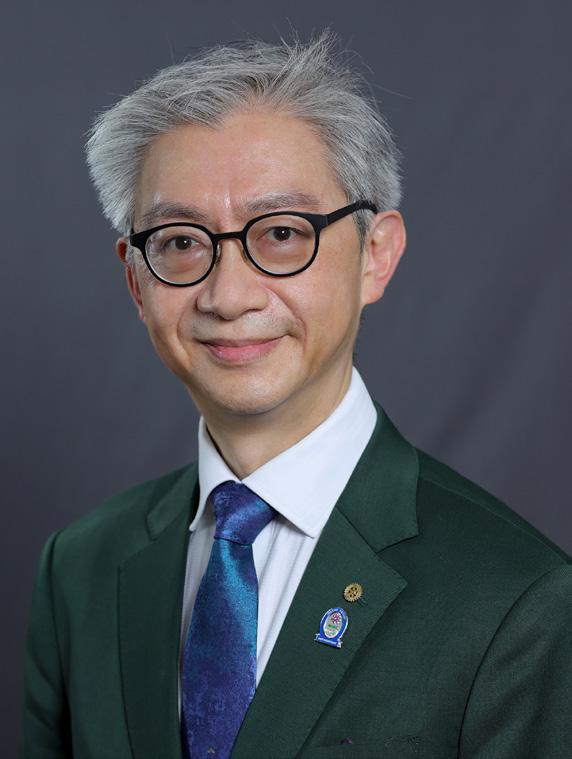
“I joined the charity over 6 years ago when I was with my last firm,” says Wai, a litigator and cybersecurity expert. “A representative from my last firm always had a seat on the board due to historical reasons. When the last representative left, no one from the firm took up the seat and I was asked to take it up. I did not have any charity or much volunteer work experience at that time, and I thought it would be a good opportunity to contribute
and learn. So, I joined and have been helping with different aspects of the charity ever since.”
Accordingly, Wai has become familiar with the story of the Ronald McDonald House movement that began somewhat innocently in Philadelphia and now has spread to 64 countries around the world over the past 48 years.
“The seeds of the partnership were planted when Kim Hill, the 3-year-old daughter of Philadelphia Eagles tight end Fred Hill, was diagnosed with leukemia,” according to the Ronald McDonald House website. “Hill and his wife camped out on the hospital chairs and benches, ate food from vending machines, and did all they could to keep Kim from seeing their sadness, exhaustion, and frustration. All around them the Hills saw other parents doing exactly the same thing. They learned that many of the families had traveled great distances to bring their children to the medical facility, but the high cost of hotel rooms was prohibitive. They continued to think, ‘There has to be a happy medium.’”
Miraculously, there was, as Hill went to work rallying the support of his Eagle teammates and team executives to help other families experiencing the same emotional and financial trauma as his own.
Spurred on by McDonald’s Regional Manager Ed Mensi, owner/operators of the popular restaurant chain in the Philly area began to chip in, donating proceeds from the sale of Shamrock Shakes to help fund the construction of the first Ronald McDonald House in 1974.
Five years later, the number of Ronald McDonald Houses had grown by 10. Over the next 5 years, 60 more houses had been
built in communities across the country. Another 53 opened in the following 5 years, as “people viewed the Ronald McDonald House as a way for a community to band together, for their neighbors in need of comfort and security during a particularly difficult time,” according to the website.
Wai, who earned his law degree from City University of Hong Kong, is proud to be part of the international network that has been a lifeline and safety net for countless families.
“We help sick children and provide a place for the family to stay together while the sick child is going through medical treatment or recuperating so that the child can have family support and care,” said Wai, who noted that the first Ronald McDonald House in Hong Kong was built more than 25 years ago.
He soon will be doubly proud when a second home opens its doors.
“The charity is building a second house with 66 rooms – the first house has 23 –near the Hong Kong Children’s Hospital and we aim to complete it by the first quarter of 2023,” Wai said. “We hope to be able to help more children and their families with the establishment of the second house.”
WINTER 2023 | 53
S
Dominic Wai
Young attorneys seek the sweet spot in worklife balancing act
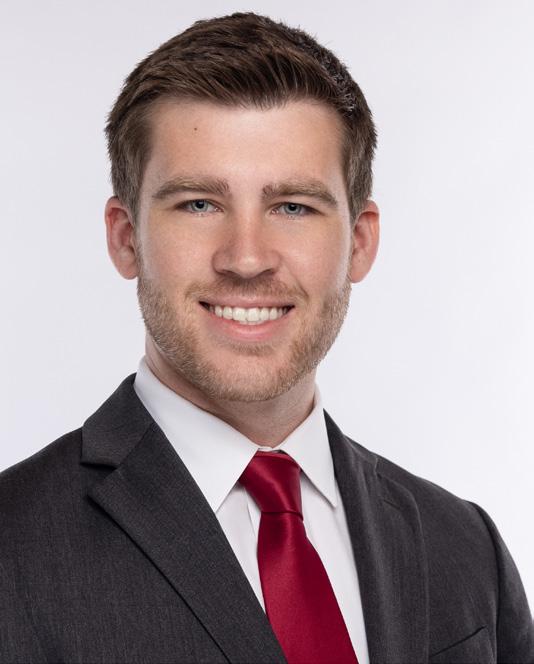
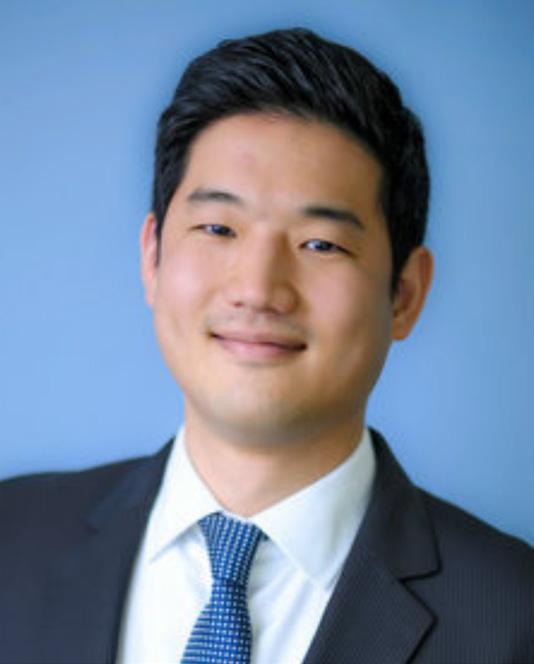
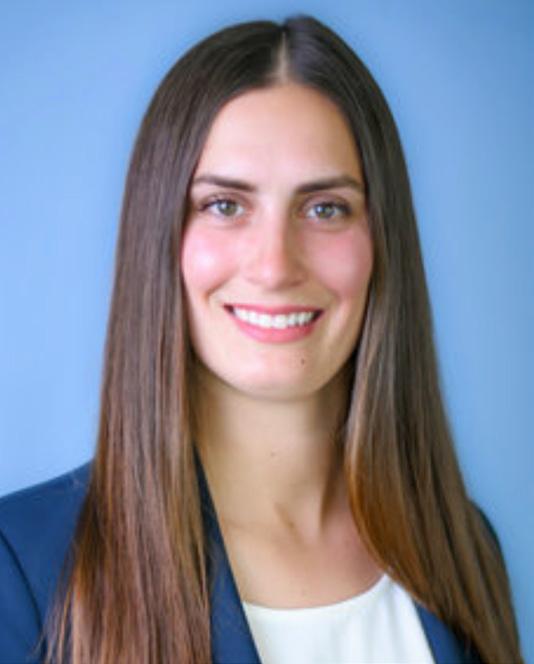
 By Tom Kirvan
By Tom Kirvan
54 | THE PRIMERUS PARADIGM ™
YOUNG LAWYERS
Max Dormer Rothman Gordon P.C.
Elyssa Kulas Ferris & Britton, A Professional Corporation
Justin Paik Ferris & Britton, A Professional Corporation
YOUNG LAWYERS “
he Young and the Not-so Restless” may well be the working title for the new breed of attorneys who are taking command of their careers and shaping their professional identities in the wake of the pandemic.
The COVID outbreak in the first quarter of 2020 upended many workplace norms, blurring the line between professional and personal life, while adding a different sort of challenge for many attorneys committed to maintaining the proper work-life balance.
Striking the right balance between work and home responsibilities has been a key priority for attorneys Elyssa Kulas, Justin Paik, and Max Dormer, three young lawyers representative of the Millennials involved with the Primerus™ community in recent years.
Justin Paik, an alumnus of California Western School of Law, is an attorney with the San Diego law firm of Ferris & Britton, specializing in business, commercial real estate, and trust and estate matters. He joined the firm in 2014 after serving as a judicial extern for a pair of magistrate judges with the U.S. District Court for the Southern District of California.
A native of South Korea, Paik immigrated to the United States with his family at the age of 17, and attended the University of California, Santa Barbara, where he earned a Bachelor of Arts in global and international studies. During law school, he served as Executive Lead Articles Editor for the California Western International Law Journal, setting the stage for his heightened involvement in bar association activities in the years ahead.
Soon after passing the bar in 2013, Paik methodically began building his professional network, joining the San Diego County Bar Association, serving as vice chair of the New
Lawyer Forum in 2016. Simultaneously, he ramped up his involvement with the Korean American Bar Association of San Diego, serving on its board of directors from 201519, including a year as president for the 2017-18 term.
“I found my service with the bar associations to be very fulfilling and it was a great way to meet members of the bench and bar,” said Paik, who currently serves as vice president of the San Diego Korean American Coalition. “I see volunteer work as a totally enriching experience.”
Paik could say the same about parenthood, which he and his wife, Linda, began experiencing in 2019 when their son, Lucas, was born.
“It was an adjustment, but in a very good way,” Paik said of becoming a father. “Our son has brought great joy into our life, while also bringing new responsibilities for both of us. It can be a real juggling act, trying to balance work with parenting.”
Fortunately, said Paik, he works at a law firm that values the importance of striking a healthy work-life balance.
“My wife is an elementary school teacher and so I have the primary responsibility of tending to our son’s childcare needs in the morning,” Paik related. “We’re fortunate that the firm gives me the flexibility to get our son ready for his day before I begin mine at the office. It’s a very caring culture, and that’s something I placed great value on when I was looking for a firm to join.”
Paik got his first taste of Primerus™ in 2015 when he attended a Young Lawyers Section meeting in Orlando, and now will serve as the firm’s chief liaison to the international organization following the retirement of longtime shareholder Michael Weinstein.
“I recently attended the Global Conference (in San Diego) and expect to become more involved in Primerus™ in the years ahead,” said Paik. “I’ve really enjoyed the opportunity to meet lawyers from around the world and to develop relationships with them.”
Elyssa Kulas, a colleague of Paik’s at Ferris & Britton, is an associate in the Litigation Department of the San Diego firm, focusing her practice on labor and employment law. As a seasoned litigator, Kulas has defended a range of employers “against single-plaintiff, class action, and PAGA (Private Attorneys General Act) claims” involving discrimination, harassment, retaliation, wrongful termination, and alleged wage and hour violations.
Born and raised in Chicago, Kulas earned a pair of bachelor’s degrees from Loyola University, graduating magna cum laude while majoring in political science and Spanish. She also holds a degree in psychology from the Jesuit school in Chicago, where she was a four-year member of the women’s soccer team for the Ramblers.
She ventured west for law school, graduating from the University of San Diego School of Law, where she was the editor-inchief of the Vis International Commercial Arbitration Moot Team and a member of the International Law Journal. Kulas joined Ferris & Britton in 2015 after clerking for the U.S. Attorney’s Office in the Civil Division and volunteering for the University of San Diego’s Small Claims Clinic.
“I wanted to branch out a bit and to enjoy a different kind of lifestyle,” Kulas said of her decision to pursue a legal career on the West Coast. “The decision came with a bonus, as I met my husband (Ray) out here while he was on active duty with the Navy after graduating from the Naval Academy in Annapolis.”
The couple is hoping to celebrate their four-year wedding anniversary in a big way on February 16, the due date for the birth of their first child, a baby girl.
“Hopefully the timing will be just right,” Kulas said with a smile.
In the meantime, Kulas said she is grateful to work for a firm that is “familyoriented” as she approaches the many joys and challenges of parenthood.
WINTER 2023 | 55
T
“I can’t imagine being on a parenthood journey where the expectation of a certain number of billable hours would come at the expense of raising a family,” said Kulas. “It would be particularly difficult in my situation since I already have a limited time to see my husband because of his regular deployments.
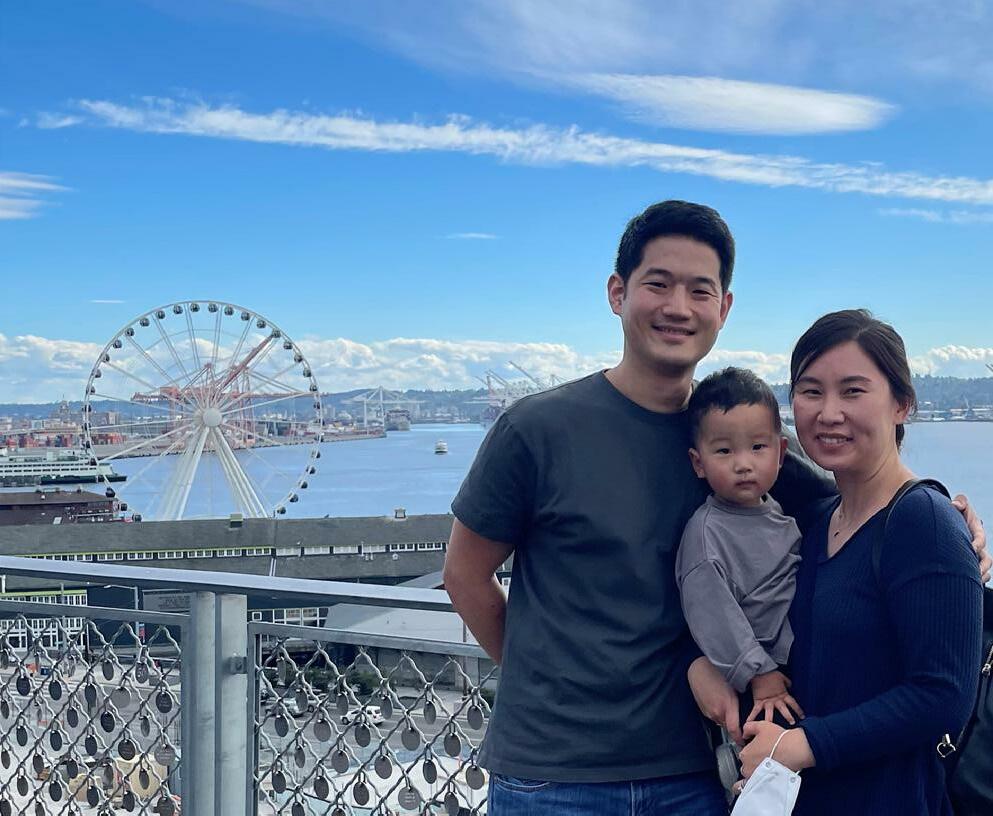
“Our firm also really was prepared for the remote work model when COVID hit, making the pivot in a very seamless and effective way,” Kulas said. “We didn’t miss a beat.”
Kulas, who was raised in a close-knit Ukrainian community in Chicago, said she has “felt the pain” from afar for those in her ancestral country who are suffering from the devastating impact of the ongoing Russian invasion.
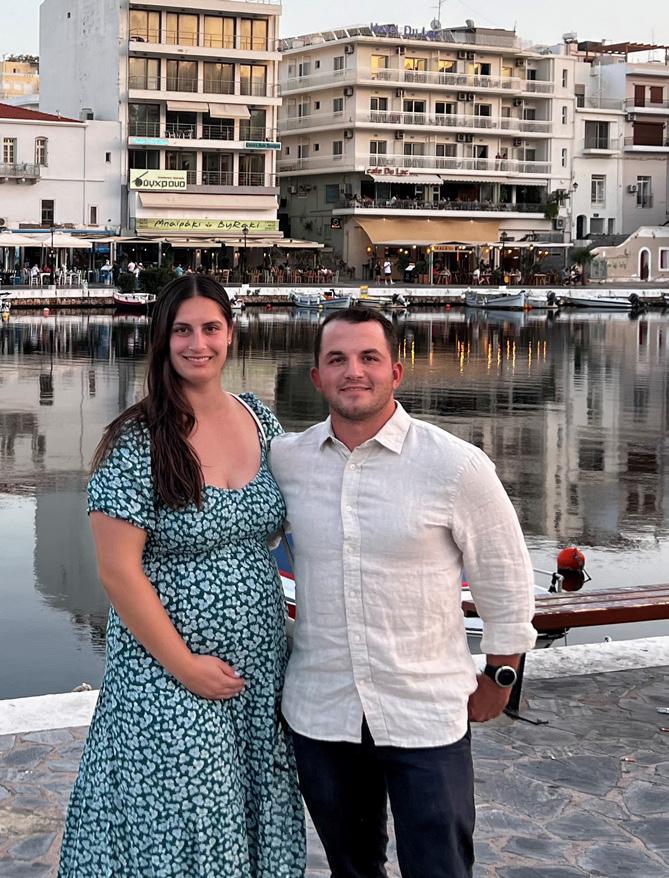
“My family has distant relatives in Western Ukraine, so the war going on there is personal to all of us,” said Kulas, whose father and 88-year-old grandfather are both attorneys in Chicago. “We so hope that the war will end soon, and that Ukraine can begin the process of rebuilding.”
Max Dormer, an associate with Pittsburgh-based Rothman Gordon P.C., joined the law firm in October 2021 as a member of its Estates & Trusts practice group. With a strong accounting background and a focus in tax law, Dormer also practices
with the Business & Corporate as well as with the Closely-Held and Family Business groups at Rothman Gordon, a firm that will mark its 70th anniversary in 2024.
A Penn State University grad with a bachelor’s degree in accounting, Dormer obtained his juris doctor in 2019 from the University of Pittsburgh Law School, where he received a Tax Law Certificate. Following law school, Dormer went to work for an accounting firm, a two-year stay during which he began the grueling four-step process of obtaining his CPA license.
“It’s a grind and involves passing four separate exams,” Dormer said of the licensing process that can stretch over several years. “I’ve completed three of the four and should receive the results from the last one – auditing – in February. It will be a relief to be finished, as it feels like I’ve spent a great deal of my adult life prepping for exams.”
In fact, he has, considering that Dormer has faced the challenge of passing the bar to obtain his law license, followed by a two-year arduous journey to earn the CPA designation.
“A lot of people ask me which is harder,” Dormer related. “I would have to say that I found the bar to be harder because there is so much material to digest. On the other hand, I definitely found it much easier to
study for the bar because the subject matter was much more interesting to read.”
Dormer grew up with his sister (Maggie) in the Pittsburgh area, where their father (Brian) has spent 40-plus years as a commercial airline pilot while their mother (Esther) has worked in the venture capital field.
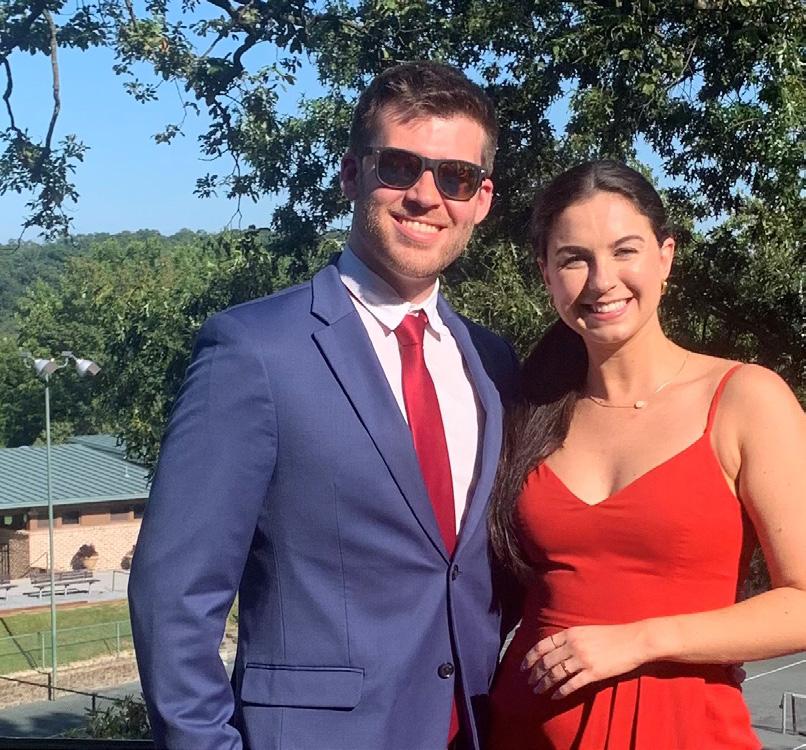
“My dad never pushed me to follow in his footsteps, principally because he wasn’t sure I had the desire to do it,” Dormer said. “He also has experienced the volatility of the airline industry, especially after 9/11, and he didn’t want me to go through those kinds of ups and downs.”
Now, as he is on the verge of having the letters JD and CPA attached to his last name, Dormer is confident of a bright future, particularly with a law firm that values professional development and growth. “I wanted to work for a firm with a great culture and I’m very fortunate to have found it here,” Dormer said of his experience at Rothman Gordon. “I consider myself extremely lucky to work at a firm that encourages growth and is willing to bring in young blood. I’m also looking forward to getting more involved with Primerus™ and to utilize the resources they provide in terms of marketing and continuing education.”
56 | THE PRIMERUS PARADIGM ™
YOUNG LAWYERS
Left, Pittsburgh attorney Max Dormer, who is on the road to becoming a CPA as well, is pictured with his girlfriend, Haley. Center, San Diego attorney Elyssa Kulas has strong family ties to the legal profession, as both her father and grandfather have practiced law in Chicago. She is pictured with her husband, Ray. Right, a favorite photo captures the essence of Justin Paik’s family, which includes his wife, Linda, and their 3-year-old son, Lucas.
Alphabetical by Country/Province/State
Asia Pacific
Australia
Carroll & O’Dea Lawyers
China
HJM Asia Law & Co LLC
Pamir Law Group
Watson & Band
Hong Kong
ONC Lawyers
India
Sarthak Advocates & Solicitors
Indonesia
Leks&Co
Japan
GI&T Law Office
Singapore
HJM Asia Law & Co LLC
Taiwan
Pamir Law Group
Europe, Middle East and Africa
Austria
OBLIN Rechtsanwälte
Cyprus
AMG Mylonas & Associates, LLC
France
Jasper Avocats
Germany
Brödermann Jahn
Greece
Bahas, Gramatidis & Partners
Ireland
Sweeney McGann Solicitors
Italy
FDL Studio legale e tributario
Kenya
Njoroge Regeru & Company
Europe, Middle East and Africa
The Netherlands
Russell Advocaten B.V.
Nigeria
Giwa-Osagie & Company
Serbia
ŠunjkaLaw
South Africa
Fluxmans Attorneys Incorporated
Spain
Dr. Frühbeck Abogados S.L.P.
North Legal
Switzerland
Suter Howald Rechtsanwälte
United Kingdom
Marriott Harrison LLP
Primerus ™ Member Law Firms
WINTER 2023 | 57
Primerus ™ Member Law Firms
Alphabetical by Country/Province/State
Latin America and Caribbean
Argentina
Badeni, Cantilo, Carricart & Bilbao
Bahamas
Evans & Co.
Belize
Quijano & Associates
Brazil
Terciotti Andrade Gomes Donato Advogados
British Virgin Islands
Quijano & Associates
Chile
Magliona Abogados
Colombia
Pinilla, González & Prieto Abogados
Costa Rica
Guardia Montes & Asociados
Cuba
Dr. Frühbeck Abogados S.L.P.
Ecuador
Meythaler & Zambrano Abogados
Guatemala
Iurisconsulti Abogados y Notarios
Honduras
Ulloa & Asociados
Mexico
Cacheaux Cavazos & Newton
Panama
Quijano & Associates
Perú
Llona & Bustamante Abogados
Trinidad & Tobago
Martin George & Co.
U.S. Virgin Islands
BoltNagi P.C.
North America
Canada
Manitoba
PKF Lawyers
Ontario
Mann Lawyers LLP
Quebec
Greenspoon Winikoff S.E.N.C.R.L., LLP
United States
Alabama
Ball, Ball, Matthews & Novak, P.A
Christian & Small LLP
Alaska
Ashburn & Mason P.C.
Arizona
Burch & Cracchiolo, P.A.
DeConcini McDonald Yetwin & Lacy, P.C.
California
Law Office of Blane A. Smith
Brayton Purcell LLP
Brothers Smith LLP
Coleman & Horowitt, LLP
Demler, Armstrong & Rowland, LLP
Dillingham & Murphy, LLP
Ferris & Britton, A Professional Corporation
Greenberg Glusker
Lynberg & Watkins, APC
Neil, Dymott, Frank, McCabe & Hudson APLC
Wilke Fleury LLP
North America
Colorado
Ogborn Mihm LLP
Timmins LLC
Zupkus & Angell, P.C.
Connecticut
Brody Wilkinson PC
Szilagyi & Daly
Delaware
McCollom D’Emilio Smith Uebler LLC
Florida
Agentis
Bivins & Hemenway, P.A.
Hodkin Stage Ward, PLLC
Mateer Harbert, P.A.
Nicklaus & Associates, P.A.
Ogden Sullivan Stover & Saar, P.A
Saalfield Shad, P.A.
Widerman Malek, P.L.
Georgia
Fain, Major & Brennan, P.C.
Krevolin & Horst, LLC
Tate Law Group, LLC
Hawaii
Yamamoto Caliboso LLC
Idaho
Elam & Burke
Illinois
Kozacky Weitzel McGrath, P.C.
Lane & Lane, LLC
Lipe Lyons Murphy Nahrstadt & Pontikis Ltd.
Roberts Perryman
Indiana
Hackman Hulett LLP
58 | THE
PRIMERUS PARADIGM ™
Alphabetical by Country/Province/State
North America
Kentucky
Eddins Domine Law Group, PLLC
Fowler Bell PLLC
Louisiana
Degan, Blanchard & Nash, PLC
Gordon Arata Montgomery Barnett
Hargrove, Smelley & Strickland
Herman Herman & Katz, LLC
Maine
The Bennett Law Firm, P.A.
Maryland
Thomas & Libowitz, P.A.
Massachusetts
Rudolph Friedmann LLP
Michigan
Buchanan Firm
Cardelli Lanfear Law
Demorest Law Firm, PLLC
McKeen & Associates, P.C.
Minnesota
O’Meara, Leer, Wagner & Kohl, P.A.
Mississippi
Young Wells Williams P.A.
Missouri
Foland, Wickens, Roper, Hofer & Crawford, P.C.
Roberts Perryman
Rosenblum Goldenhersh
Montana
Datsopoulos, MacDonald & Lind, P.C.
North America
Nevada
Laxalt Law Group Ltd.
Richard Harris Law Firm
Sklar Williams PLLC
Winner Booze & Zarcone
New Jersey
Earp Cohn P.C.
Mandelbaum Barrett PC
Thomas Paschos & Associates, P.C.
New Mexico
Hinkle Shanor LLP
New York
Barton LLP
Coughlin & Gerhart, LLP
Ganfer Shore Leeds & Zauderer LLP
Lewis Johs Avallone Aviles, LLP
Nolan Heller Kauffman LLP
North Carolina
Smith Debnam Narron Drake Saintsing & Myers, LLP
Ohio
Mellino Law Firm, LLC
Schneider Smeltz Spieth Bell LLP
Oklahoma
Fogg Law Firm
The Handley Law Center
Smiling, Smiling & Burgess
Oregon
Haglund Kelley, LLP
Pennsylvania
Earp Cohn P.C.
Rothman Gordon
Law Offices of Thomas J. Wagner, LLC
North America
Rhode Island
McKenney, Clarkin & Estey, LLP
South Carolina
Collins & Lacy, P.C.
Rosen Hagood
South Dakota
Lynn, Jackson, Shultz & Lebrun, P.C.
Tennessee
Barton PLLC
Cornelius & Collins, LLP
Texas
Donato, Brown, Pool & Moehlmann
Downs & Stanford, P.C.
Moses, Palmer & Howell, L.L.P.
Stephenson Fournier
Thornton, Biechlin, Reynolds & Guerra, L.C.
Virginia
Goodman Allen Donnelly
Wharton Aldhizer & Weaver, PLC
Washington
Beresford Booth PLLC
Johnson Graffe Keay Moniz & Wick, LLP
Menzer Law Firm, PLLC
West Virginia
Hendrickson & Long PLLC
The Masters Law Firm, L.C.
Wisconsin
Kohner, Mann & Kailas, S.C.
Wyoming
Gary L. Shockey, PC
WINTER 2023 | 59
Primerus ™ Member Law Firms




International Society of Primerus Law Firms™ 452 Ada Drive, Suite 300 Ada, Michigan 49301 Tel: 800.968.2211 (toll-free) Fax: 616.458.7099 primerus.com The International Society of Primerus Law Firms™ finds and accepts only the finest independent law firms and lawyers. Primerus ™ Member Firms Globally North America Region 105 Latin America & Caribbean Region 17 Europe, Middle East & Africa Region 16 Asia Pacific Region 10 The World’s Finest Law Firms™









 By Tom Kirvan
By Tom Kirvan

 By Tom Kirvan
By Tom Kirvan




 By Tom Kirvan
By Tom Kirvan


 By Tom Kirvan
By Tom Kirvan



 By Tom Kirvan
By Tom Kirvan







 Attorney Andrew Griffin, far left, aboard a Soviet helicopter in the mid-1990s that transported workers to and from an oil-producing site in the vastness of Siberia.
Attorney Andrew Griffin, far left, aboard a Soviet helicopter in the mid-1990s that transported workers to and from an oil-producing site in the vastness of Siberia.


 By Tom Kirvan
By Tom Kirvan






 By Brian Cox
By Brian Cox











 By Brian Cox
By Brian Cox




 By Tom Kirvan
By Tom Kirvan














 By Tom Kirvan
By Tom Kirvan





